

Along with records broken and medals celebrated, competing at the Olympics is more often littered with narrow defeats, last-gasp errors and mental meltdowns that build true character and sportsmanship.

If it weren't for the different flags sewn on the athletes' uniforms, some early-round table tennis matches at the Paris Olympics could have been mistaken for a national championship in China.
The women's singles match between China's 23-year-old Sun Yingsha, the top seed and world No 1, and Luxembourg's Ni Xialian, 61, left the crowd marveling at the huge age gap between the two players.
Both athletes speak Mandarin and were born in China, and developed their table tennis skills under the Chinese training system, which has seen the country dominate the sport.
Despite a straight-sets loss to Sun in the round of 32 on July 31, Ni etched her name in table tennis history. She is the first woman to have competed in table tennis at six Olympic Games and the oldest to win a match after she defeated Sibel Altinkaya of Turkiye in the opening round on July 27.
An hour after that match, another showdown between two Chinese-born athletes sent the crowd at the South Paris Arena into a frenzy. Veteran Yuan Jianan, representing the host nation France, outplayed Zhang Mo of Canada to advance to the round of 16.
Three days earlier, Portugal's three-time Olympian Fu Yu delivered a major upset by defeating the 9th seed Jeon Ji-hee of South Korea in straight sets. Despite playing under different flags, fans in China rooted for the two "foreign" athletes, who were both born in Hebei province.
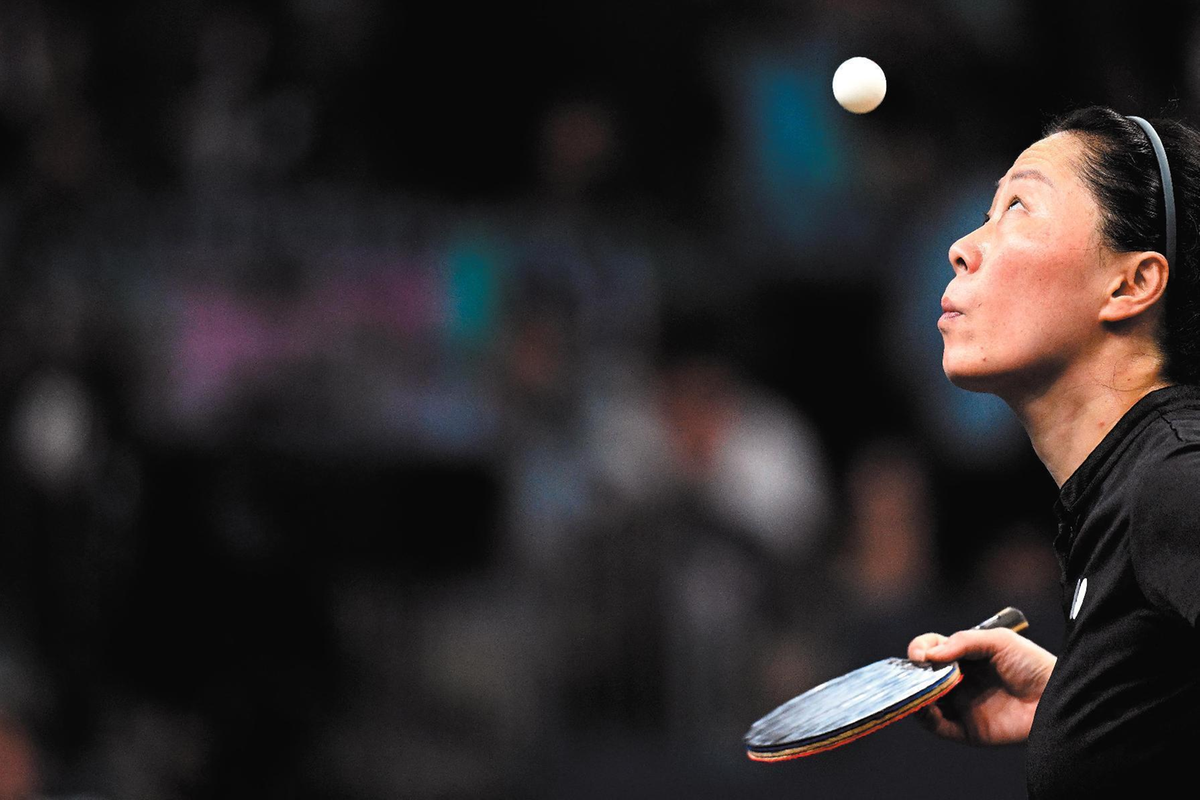
Excess of talent
Chinese-born players representing adopted countries is a trend that started in the 1980s. Back then, Chinese athletes began changing nationality to compete for other countries, driven by the prospect of brighter career opportunities, which wouldn't be available to them at home.
As a world power in sports like table tennis, badminton and diving, China is never short of talent thanks to its rigorous State-run development system.
With these sports producing more world-class talent than China needed, some of those "surplus athletes" opted to pursue their athletic careers elsewhere, after being approached by national Olympic committees of other countries eager to boost their talent pool.
In table tennis alone, as many as 13 players born on the Chinese mainland, where they developed their skills, are representing other NOCs in the men's and women's singles tournaments at the Paris Games.
The two oldest table tennis players at the Paris Olympics, Ni and her former teammate Zeng Zhiying, 58, were among the first generation of Chinese national team players who moved overseas to extend their sports careers by becoming naturalized citizens of other countries.
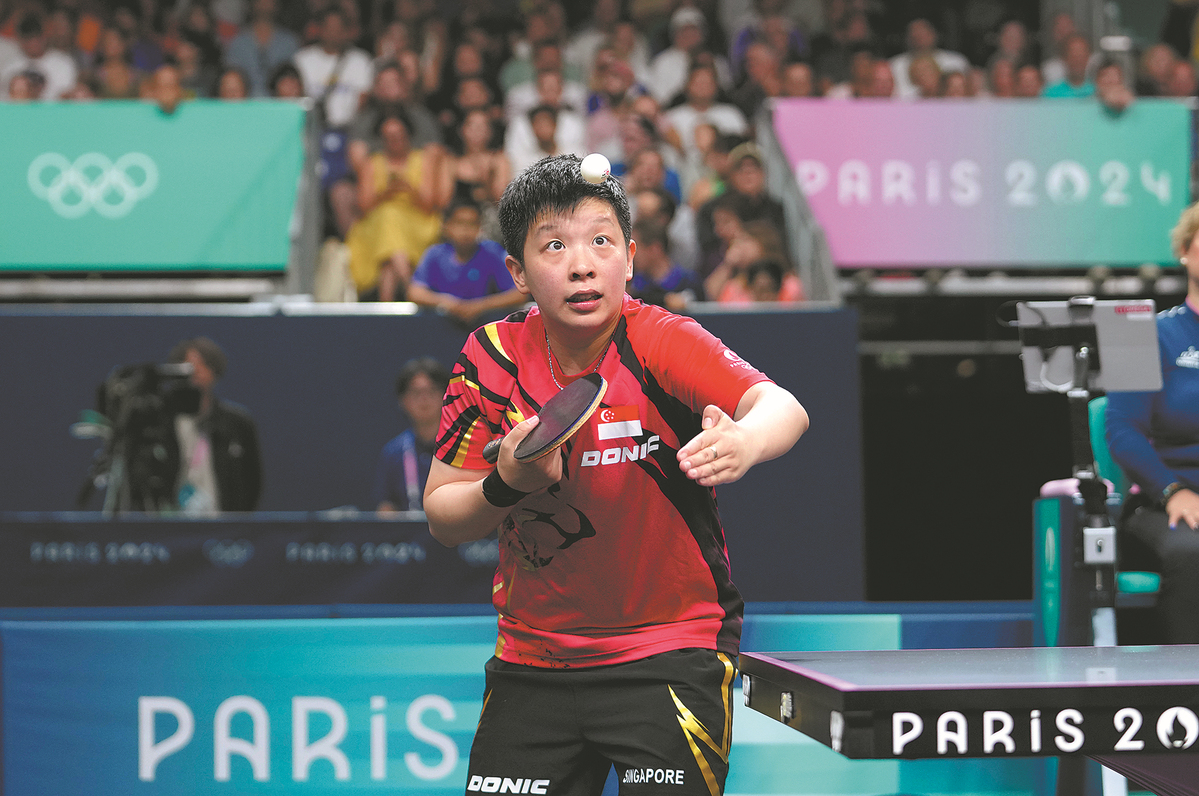
Chinese media have dubbed these sporting emigrants the "foreign legion". While they only have a slim chance of beating better players from their country of birth, they relish the opportunity to participate in international competitions.
"If I'd stayed in China, I probably would have never had the chance to compete at the Olympics because there is always too much talent coming from the pipeline of the Chinese system," Zeng Jian, 27, who represents Singapore in table tennis, told China Daily after her round of 32 match in Paris.
The four-time Commonwealth Games medalist was born in China's Hunan province. She started table tennis training at the age of 6 at the Shichahai Sports School in Beijing. In 2013, she represented the Beijing team in the Chinese Table Tennis Super League, playing doubles with former world champion Guo Yan.
With the domestic competition too intense for her to advance any further, she joined the Singapore Table Tennis Association in late 2014.
Zeng said she has no regrets about the life-changing decision. "I feel grateful for the Singapore association offering me a chance where my skills and years of hard work could be appreciated," she said, adding the switch helped her play in the international arena, which wouldn't have happened if she had stayed in China.
With cultural and language similarities to China, since the late 2000s Singapore has emerged as an ideal destination for Chinese-born table tennis players seeking new opportunities.
Bolstered by former Chinese youth team members Feng Tianwei and Wang Yuegu, the Singapore women's team shocked the Chinese squad with a 3-1 win at the 2010 World Team Championships final. It is the biggest upset win of the "foreign legion" against their birth country.
To encourage the development of homegrown talent across the world, the International Table Tennis Federation tightened its rules on athlete naturalization in 2008. It banned athletes older than 21 who had switched nationalities, from representing his or her adopted country in international competitions.
The rules also impose a waiting period of at least three years before a naturalized athlete can represent his or her new national, or regional, association.
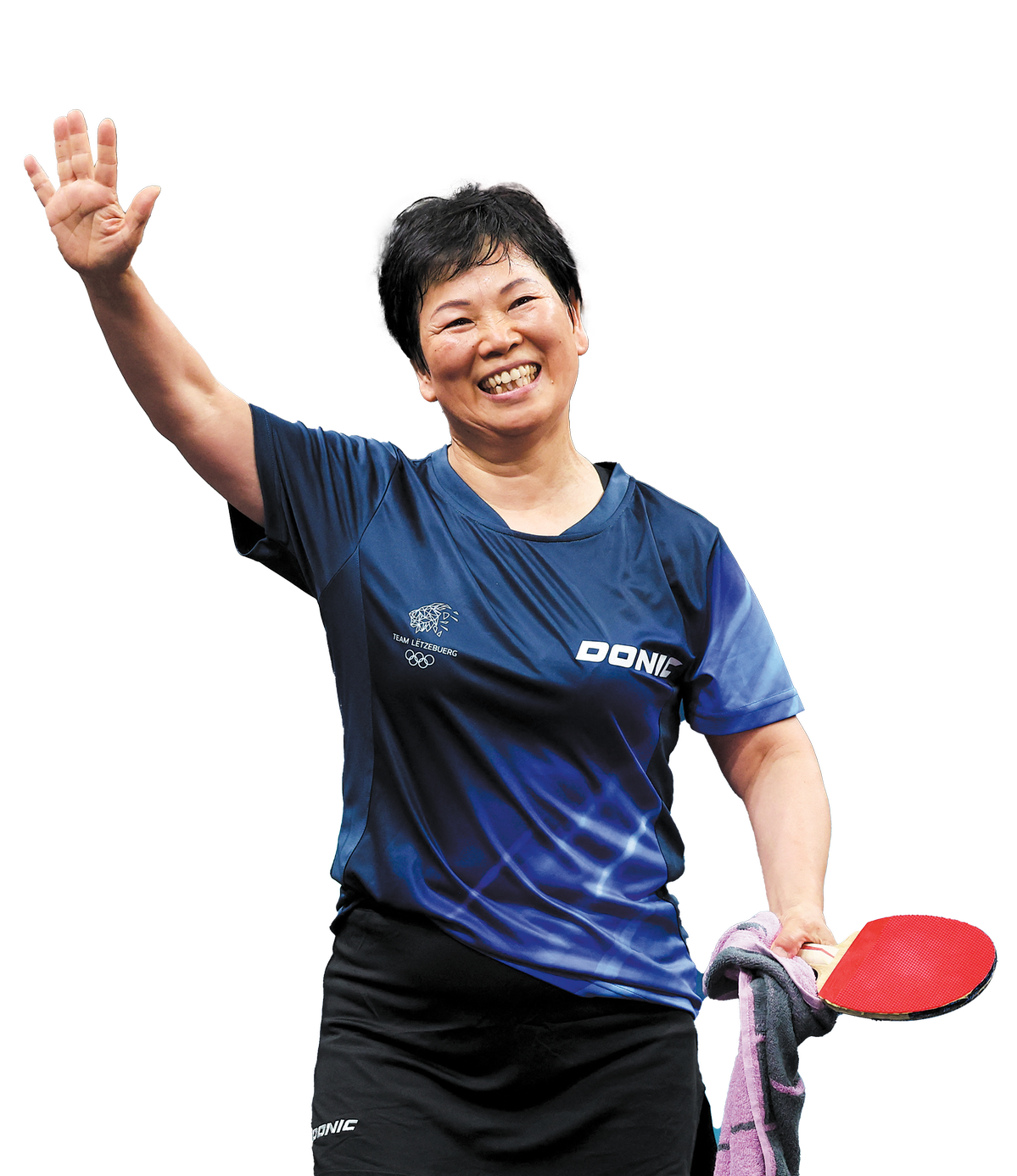
Teammates reunite
Major international events such as the Olympics have also become a stage for reunions of old friends and former teammates born in China.
In Paris, Luxembourg's Ni reconnected with her former teammate Zeng Zhiying, 58, almost four decades after they both played for Team China in the 1980s. Zeng made her Olympic debut in Paris representing Chile.
Zeng was born in 1966, and her mom was a table tennis coach. She picked up a paddle as soon as she could hold one, and joined the junior team at a military sports school in Beijing at the age of 11. Zeng started to compete at national-level events the next year.
Like all her peers, she aspired to make her country proud on the international stage, and harbored a longtime dream to compete at the Olympics. However, Zeng's attempt to qualify for the Los Angeles 1984 Olympics came up short due to the intense competition among her peers, including Ni, for spots on the national team.
Failing to make it to Los Angeles, Zeng retired and moved to Chile, and accepted an invitation to coach school children in the northern city of Arica. She said she "adored" her coaching job.
Zeng didn't pick up a table tennis paddle again until 2003 when she wanted to introduce her 13-year-old son to the sport to try and drag him away from video games and watching television.
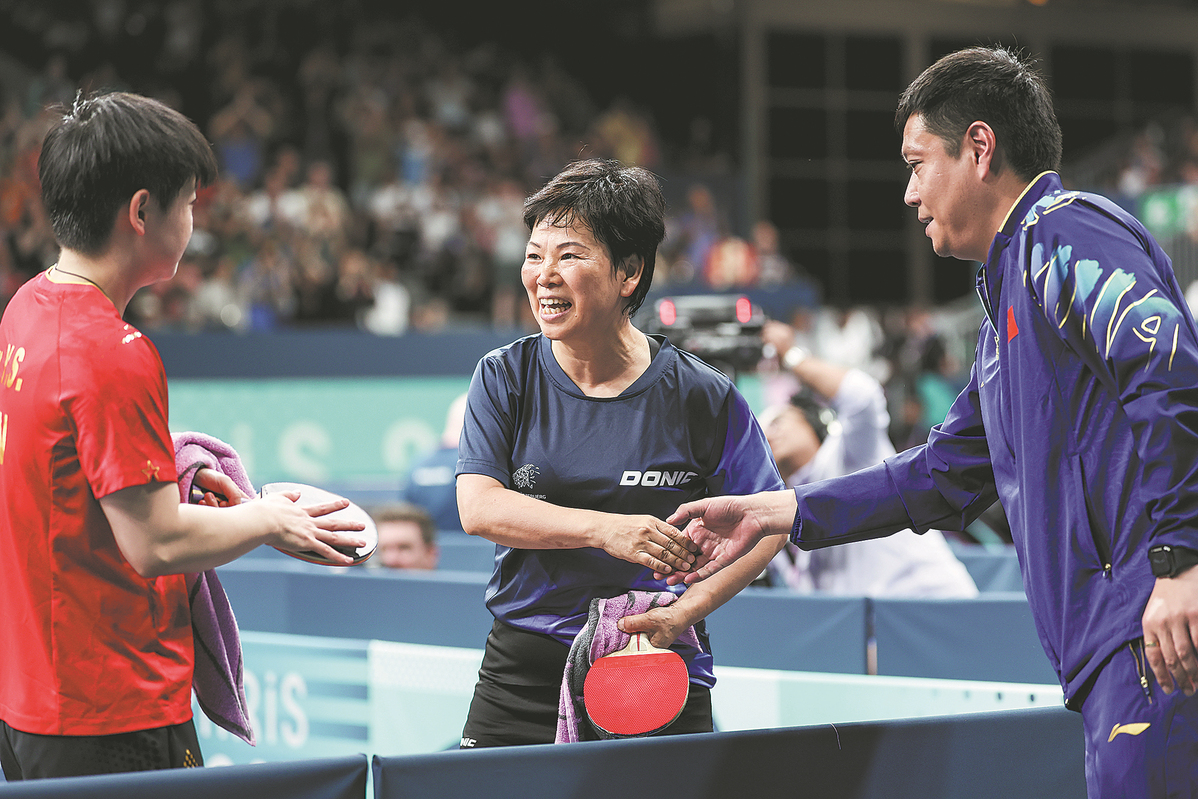
However, the competitor now in her 50s realized she could still win at the national level in Chile, which rekindled her Olympic dream.
"I love this country," she said after losing in the preliminary round at the Paris Games on July 27. "I didn't reach my dream in China, and I have here. It's important not to give up."
Despite her early exit from the competition she had every reason to be proud of her efforts in Paris. Her husband and two sons cheered her on in the South Paris Arena and her 92-year-old father back in China was able to see his daughter's lifelong dream come true.
Ni, who was in China's squad at the 1983 Table Tennis World Championships, said they were both on the national team for a period of time.
"It's not easy for her to make a return to this level after not playing for such a long time," Ni said. "No matter what, she built her foundation in the Chinese national team, and that will always make a difference (in international competitions). I congratulate her for making it to Paris."
As to whether her Olympic journey is over, Ni said she is not planning to hang up her paddle any time soon. With support from the sport's governing body in Luxembourg and the grand duchy's government, she said she remains fresh and motivated, even at the age of 61.
"Age is just a number," said Ni, who was born in Shanghai and began her career with the city's women's team in 1978.
She moved to Germany in 1989 for career prospects, and settled down in Luxembourg two years later. There she met her husband Tommy Danielsson, the then Luxembourg national team coach.
"Three years ago, Paris 2024 felt so far away, but I just thought let's keep trying," she said.
"Our team really needs me, and everyone was working so hard. I saw staying around as a way to motivate them. If we make it (to Los Angeles 2028), great. If we can't, then we just enjoy the journey."
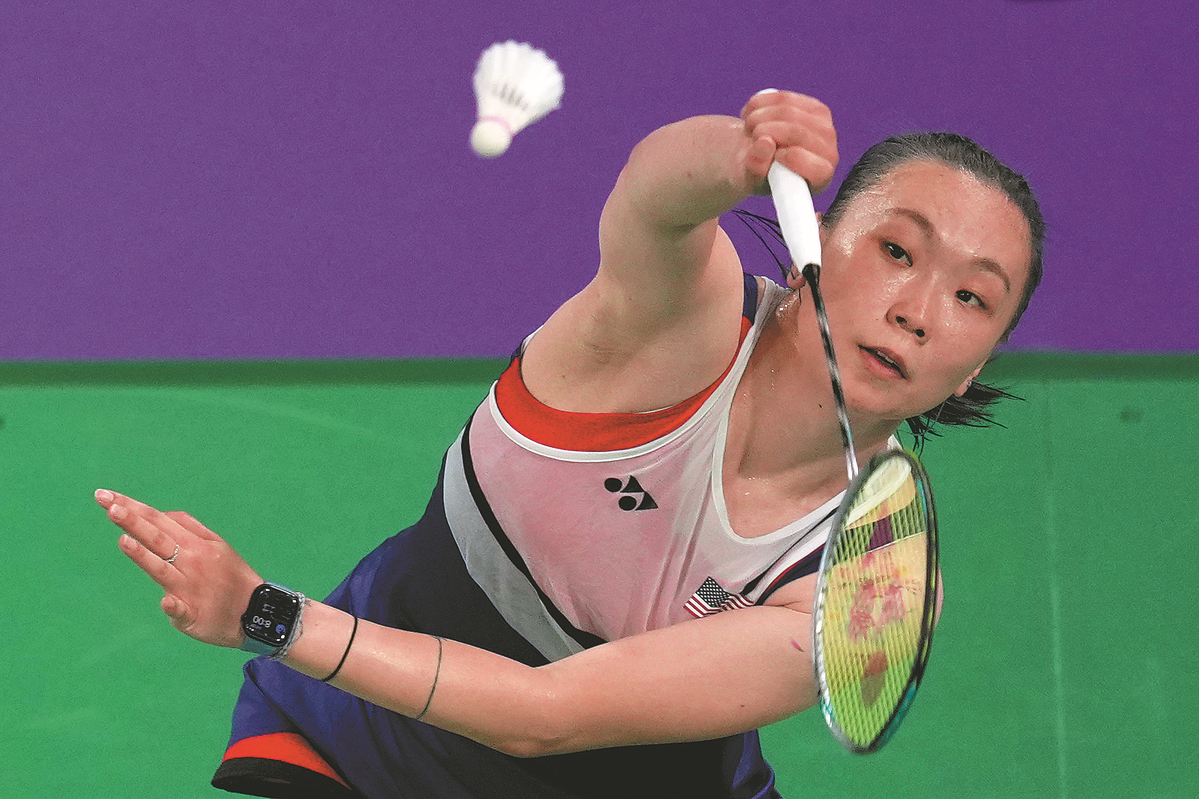
Second thoughts
In addition to table tennis, Chinese names can also be found on several other countries' team lists for badminton and diving.
However, the transition to a different culture, coupled with the language barrier, can make it tough for some Chinese athletes to fit in to their adopted homes.
Zhang Beiwen, a badminton player representing the United States in Paris, said it's not always easy to navigate cultural differences, especially for those who moved overseas at an older age. "If you move to the US too late, I don't think it's worth it," said Zhang.
She started playing badminton in her hometown of Anshan, Liaoning province, and moved to Singapore along with her provincial team coach at the age of 13. Following a feud with her coach, she resettled in the US in 2013 and joined Team USA.
" (Latecomers) will have a hard time learning the language and getting used to the social environment," she said.
"It's not easy to compete at your best on the court when you have to deal with new challenges in life adapting to a new home."
Not all China-born athletes receive a warm welcome in their adopted countries, as sometimes their presence is seen as compromising the development of homegrown talent.
"There have always been some complaints from local fans," said Peter Hubner, a sports reporter covering table tennis in Paris for German media outlet Deutsche Presse-Agentur.
"They're afraid that the use of Chinese immigrants may affect the resources and funding allocated to developing native talent. It makes sense. But it will be easier for the second generation of Chinese players to be accepted."
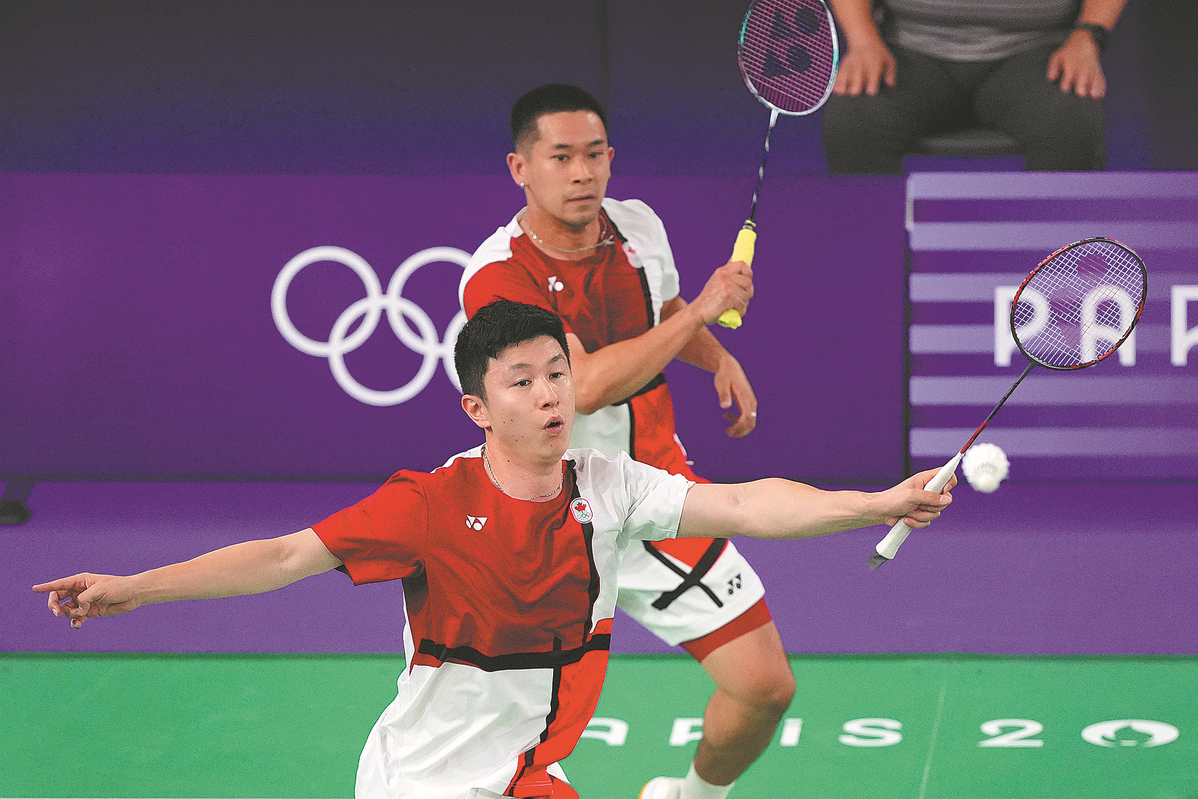

PARIS - China's boxer Chang Yuan secured the women's 54kg gold at the Paris Olympic Games here on Thursday night in a clear unanimous decision against Turkey's Hatice Akbas.
Chang's gold represents China's first-ever Olympic women's boxing title.
In a tentative opening round, Chang, perhaps wary of her opponent's longer reach, lacked a little of the volume that she had shown in her previous bouts. However, Chang used her double jab to open up, and Akbas began to pay dividends for her powerful left.
Chang began to throw more punches in bunches in the second round to secure consecutive rounds. Once again, Chang expertly used her jab to slice through Akbas's defense for her sharp inside boxing. The Turk struggled to cope with the pressure, resorting to clinches to try and halt Chang's momentum.
In the third bout, it was more of the same, as Chang began to increase her volume and expose the gulf in class between the two. After her name was called as the winner, Chang was hoisted into the air by her coach as the Chinese contingent in the crowd celebrated with her.
After falling in the quarterfinals in Tokyo, Chang had to change her mindset to achieve gold.
"After the 2021 Tokyo Olympics, my mindset changed significantly. I became less impatient and restless. Recently, while preparing for Paris, I've managed to control my mindset and emotions well. This competition might help me gain a deeper understanding of myself. There are probably still many areas where I need to make changes," Chang admitted.
"I'm very excited. From the regret of the Tokyo Olympics to winning China's first gold in women's boxing today, it's a huge moment for me. At Roland Garros, tennis players have seen the national flag rise, and this time, it rose because of me. I feel very proud and honored."
In a women's 75kg semifinal, China's Li Qian came from a round down against Australia's Caitlin Parker to win by unanimous decision. The Chinese started slow and allowed Parker to get inside her range and score big in the first round. However, Li came back with a vengeance in the second round as she started to land from the outside and used her footwork and head movement to avoid the Australian's counterpunches. Li continued her momentum through the third round and maintained her superior accuracy to book her place in the gold medal bout.
"In the second and third rounds, I was more proactive. The first round was pretty even, but I was behind 5-0. So, I focused on being more aggressive, increasing my attacks, and putting more pressure on my opponent," Li reflected on the first round.
Li will face Panama's Atheyna Bylon in the final, after she defeated Cindy Winner Djankeu Ngamba of the Olympic Refugee team in a split decision 4-1.
In the men's 51kg final, Hasanboy Dusmatov won Uzbekistan's second boxing gold, beating France's Billal Bennama by unanimous decision. Backed by an ear drum-bursting rendition of La Marseillaise, the height difference between the two fighters was apparent, with the French No 1 seed towering over his Uzbek foe.
Yet, it was Dusmatov who came out on top marginally on three of the judges' scorecards. In the second bout, the French fighter struggled to catch Dusmatov on entry as the Uzbek's superior head movement started to produce gaps in Bennama's defense. With the momentum firmly with Dusmatov at the start of the final bout, the Uzbek continued to exploit the body of Bennama to leave openings upstairs for slick hooks.
At the start of the night in the men's 57kg semifinals, Abdumalik Khalokov thoroughly outclassed Australia's Charlie Senior in a unanimous decision. The Uzbek fighter effectively won every single bout on nearly every scorecard. Khalokov will face Kyrgyzstan's Munarbek Seiitbek Uulu, who defeated Bulgaria's Javier Ibanez Diaz in a scrappy bout via split decision 4-1.
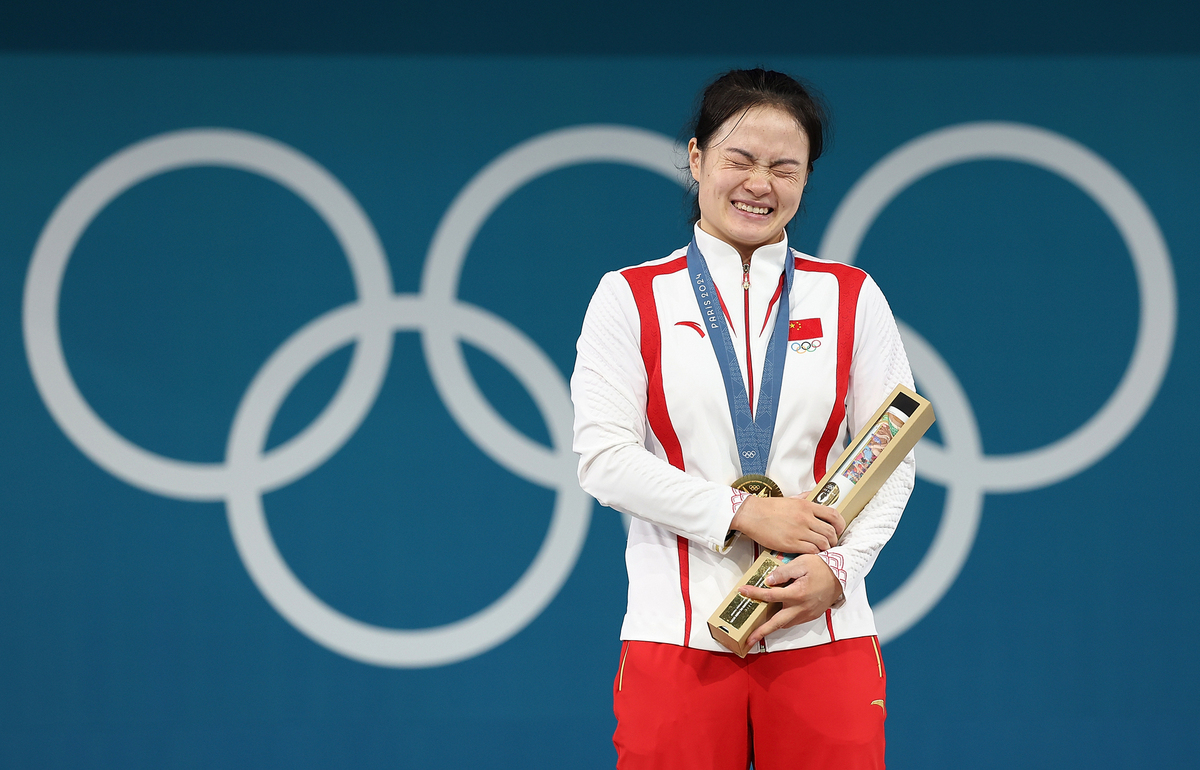
Chinese weightlifter Luo Shifang won the gold medal in the women's 59-kilogram division at the Paris Olympics on Thursday, marking the third gold for the nation's weightlifting team at the Games.
Luo's medal brought China's gold haul in Paris to 28.
Previously, both Li Fabin, the defending Olympic champion in the men's 61kg division, and Hou Zhihui, who was gold medalist in the women's 49kg division at the Tokyo Games, retained their titles.
Luo, 23, ranked No 1 in both the snatch event, with 107kg, and the clean and jerk, with 134kg, setting three Olympic records, in snatch, clean and jerk, and total weight. Maude Charron of Canada took silver and Kuo Hsing-chun of Chinese Taipei claimed bronze.
Meanwhile, propelled by strength and steered by willpower, Chinese paddlers Liu Hao and Ji Bowen won China's third straight Olympic title in the men's canoe double 500-meter.
Boasting strong pushes individually and exceptional synchronization of pace in the sprint, Liu and Ji started the final strong to take an early lead. They clinched the gold by paddling past the finish line first in one min, 39.48 sec, while Italy's Gabriele Casadei and Carlo Tacchini won silver and Spain's Joan Antoni Moreno and Diego Dominguez took the bronze.
The Chinese duo's three-peat followed a 16-year wait, after the double 500m was excluded from the past three Games' sports programs, from 2012 to 2021, before its return in Paris.
China's legendary duo of Yang Wenjun and Meng Guanliang, both retired, claimed back-to-back gold medals in the double event at two previous Olympic regattas — Athens 2004 and Beijing 2008 — to become the first and only pair in the world to defend the title.
"With everything just falling into place, I feel we had a magical race today," said Ji, a 22-year-old native of Zhejiang province who made his Olympic debut in Paris.
"We started out fast, took an early lead, and from there we were just paddling as hard as we could to our own pace, and the result came as expected.
"To make it happen on a memorable day for all the Chinese Olympians, I am so excited and satisfied," said Ji, who only started to partner with Liu, a two-time Olympian, at the end of 2021.
The golden race on Thursday capped the steady progress of Liu and Ji during the Paris Olympic cycle on a high note, following their bronze finish at the 2022 world championships and silver at the 2023 world championships.
Since China is the only Asian country to ever have won medals in the event, the nation's future as a dominant force is in good hands, said Liu.
"In Tokyo I took two silver medals, so winning the gold medal means a lot to me, and it's very important for my country as well. It's compensation for what I've done up until now," said Liu, a runner-up in single and double 1000m at Tokyo 2020.
Ji "is very young and motivated; he will be the future of China," said Liu, who pushed with Ji to reach an Olympic record time of 1:37.40 in their heats on Tuesday.
On Thursday at the Paris Aquatics Centre, China's invincible diving team also maintained its golden streak after men's divers Xie Siyi and Wang Zongyuan finished No 1 and No 2, respectively, in the 3m springboard final to grab the Chinese diving team's sixth gold and second silver in the pool.
After winning six out of six disciplines by the end of Thursday, the Chinese diving "dream team" stayed on course to achieve the clean sweep of all eight gold medals in diving at the Olympics for the first time in history.
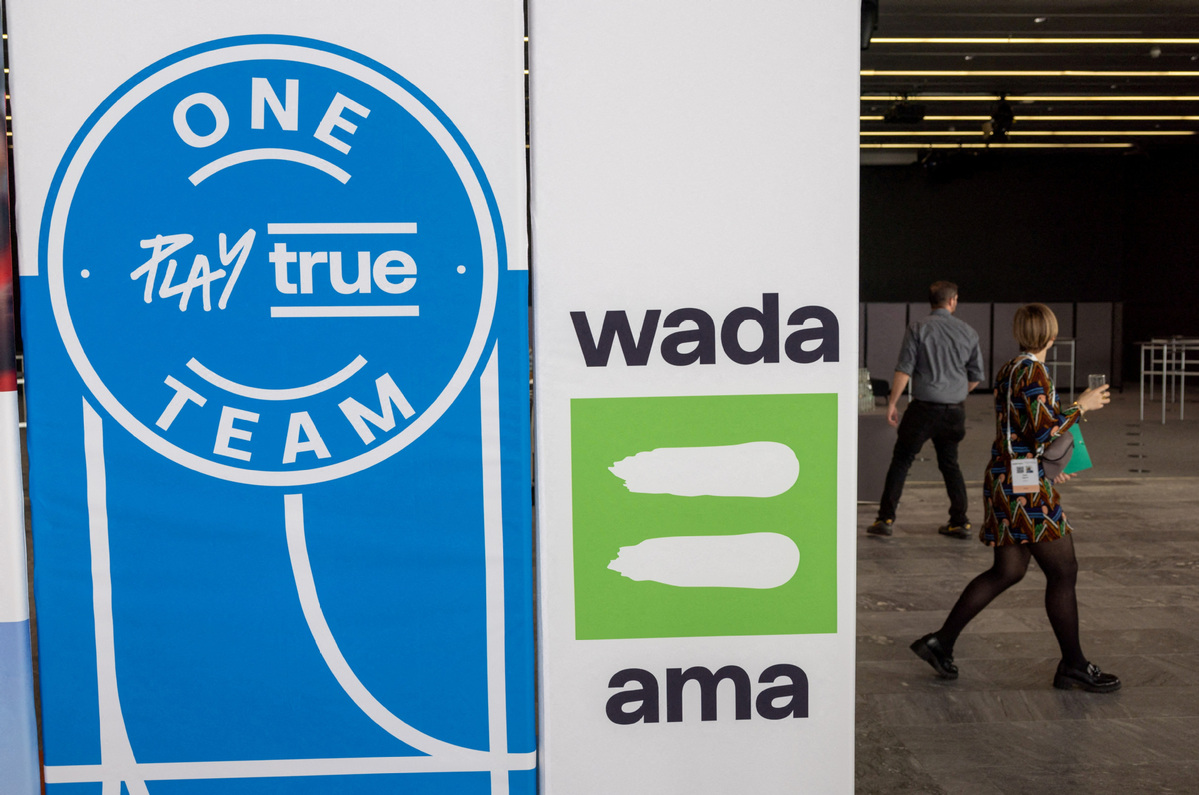
China's anti-doping watchdog has called for an independent investigation into the United States Anti-Doping Agency's cover-up of drug rule violations after the international governing body for clean sports accused the USADA of serious breach of the global anti-doping code.
In a statement released on Wednesday, the World Anti-Doping Agency revealed that since 2011, there have been at least three cases where US athletes who had violated anti-doping rules were exonerated by the USADA and allowed to keep competing in exchange for acting as "undercover agents" and gathering information on other doping offenders.
WADA said it had never signed off on such an arrangement and wasn't aware of the USADA's practice until 2021. It instructed the USADA to immediately revoke the arrangement, WADA said.
In one of the cases, an elite-level athlete who competed in an Olympic qualifier and international events in the US admitted to taking steroids and erythropoietin enhancing drugs, but was still allowed to continue competing until retirement.
The case was never published, the results never disqualified, the prize money never returned, and no suspension ever served, WADA said, adding that it is hypocritical on part of the USADA to accuse other anti-doping organizations of not following the rules.
On Thursday afternoon, the China Anti-Doping Agency released a statement saying the USADA's practice blatantly mocks the principle of fair play in sports, severely damages the rights and interests of clean athletes, and shows a serious lack of transparency in the USADA's anti-doping work.
Not prosecuting doping offenders in exchange for information is, in effect, a cover-up of anti-doping rule violations by the USADA, the Chinese agency said, calling for an independent probe and seeking full disclosure of relevant cases.
It was the third statement issued by China's anti-doping watchdog this week, urging the US to drop its double standards when dealing with cases involving its own athletes and those from other countries.
Earlier on Thursday, CHINADA called on the International Testing Agency to intensify its monitoring of US athletes, especially those competing in track and field events, and rebuild global trust, while citing the case of Olympic sprinting star Erriyon Knighton who tested positive for trenbolone, a banned performance enhancing steroid, during an out-of-competition test in March.
Knighton, 20, was unilaterally exonerated by the USADA and allowed to represent the US at the Paris Olympics. He became a finalist for the men's 200m race after topping the third semifinal heat on Wednesday with a time of 20.09 seconds.
In a statement released on Thursday morning, China's anti-doping watchdog said the case has been widely reported by the media at home and abroad, which prompted the USADA to issue a public statement claiming that trenbolone is a common contaminant in the US.
Hundreds of positive tests for trenbolone have taken place worldwide in recent years, but only US athletes have escaped sanctions based on the USADA's investigative findings and claims of meat contamination, the Chinese agency said.
However, while Knighton tested positive for trenbolone, the USADA decided that no ineligibility would be imposed on him, saying the positive result was caused by the consumption of contaminated meat, CHINADA said in a statement issued on Tuesday.
Knighton's case has once again put doping incidents in the US in the spotlight. Such incidents are far too common in US athletics, and the USADA's handling of these cases has been inconsistent and questionable, CHINADA said.
In another case in April, US track athlete Aldrich Bailey tested positive for ostarine, an anabolic agent that helps with muscle growth, fat loss and testosterone regulation, during an out-of-competition supervision.
Even though ostarine is not a common contaminant, the USADA ruled that the positive result was due to contaminated neoprene hamstring sleeves commonly used by athletes.
Given the USADA's repeated disregard for procedures and standards, there is reason to suspect that the doping problem in US athletics is systemic, and therefore the positive cases need continuous investigation and monitoring, CHINADA said in Thursday's statement.
It strongly urged the ITA to intensify its testing of US track and field athletes and called on the Athletics Integrity Unit to strengthen its anti-doping supervision, in order to protect the legitimate rights and interests of athletes who compete fairly and rebuild the trust in athletes worldwide.
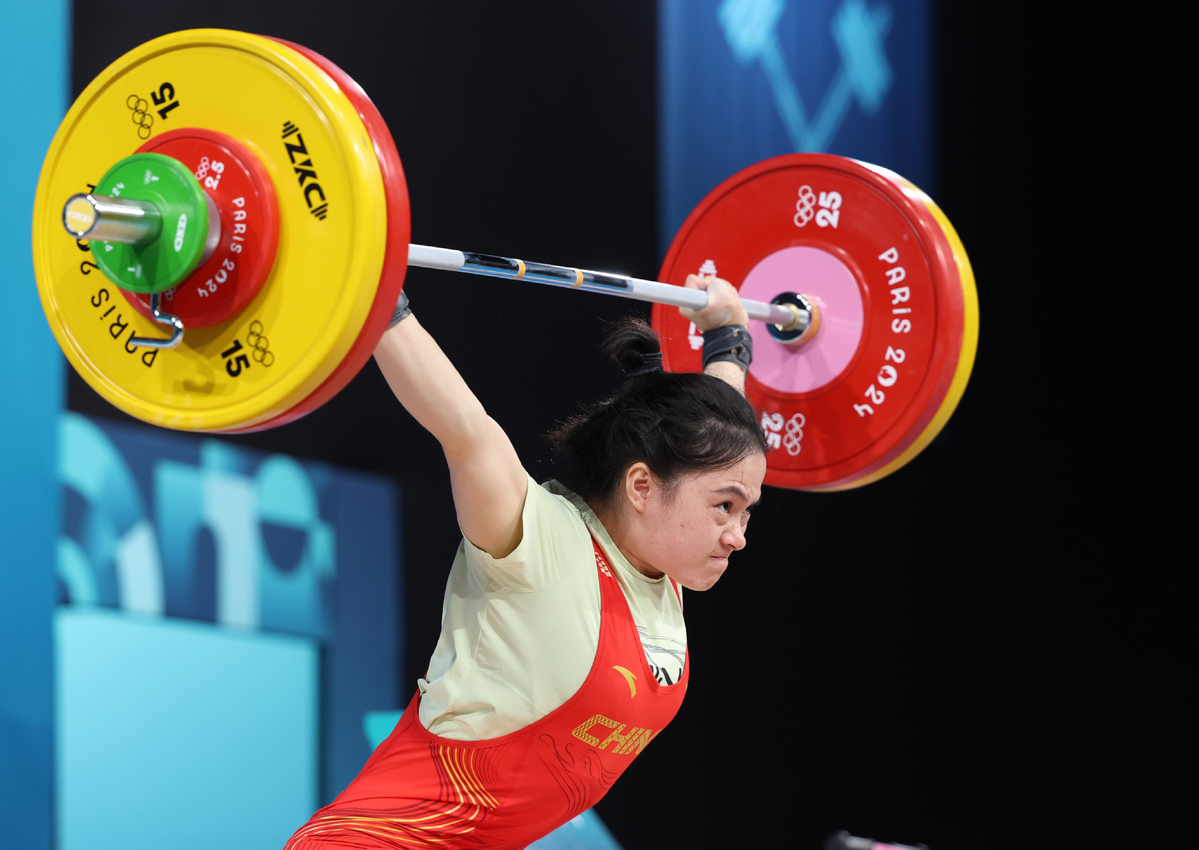
PARIS -- China's Luo Shifang claimed the women's 59kg weightlifting gold medal at the Paris Olympics on Thursday.
Luo, who is making her Olympic debut in Paris, lifted 107kg in the snatch and 134kg in the clean and jerk to go with a winning total of 241kg, setting three new Olympic records.
Canada's Maude Charron bagged the silver medal with 236kg, and Tokyo 2020 champion Kuo Hsing-Chun of Chinese Taipei took bronze with 235kg.
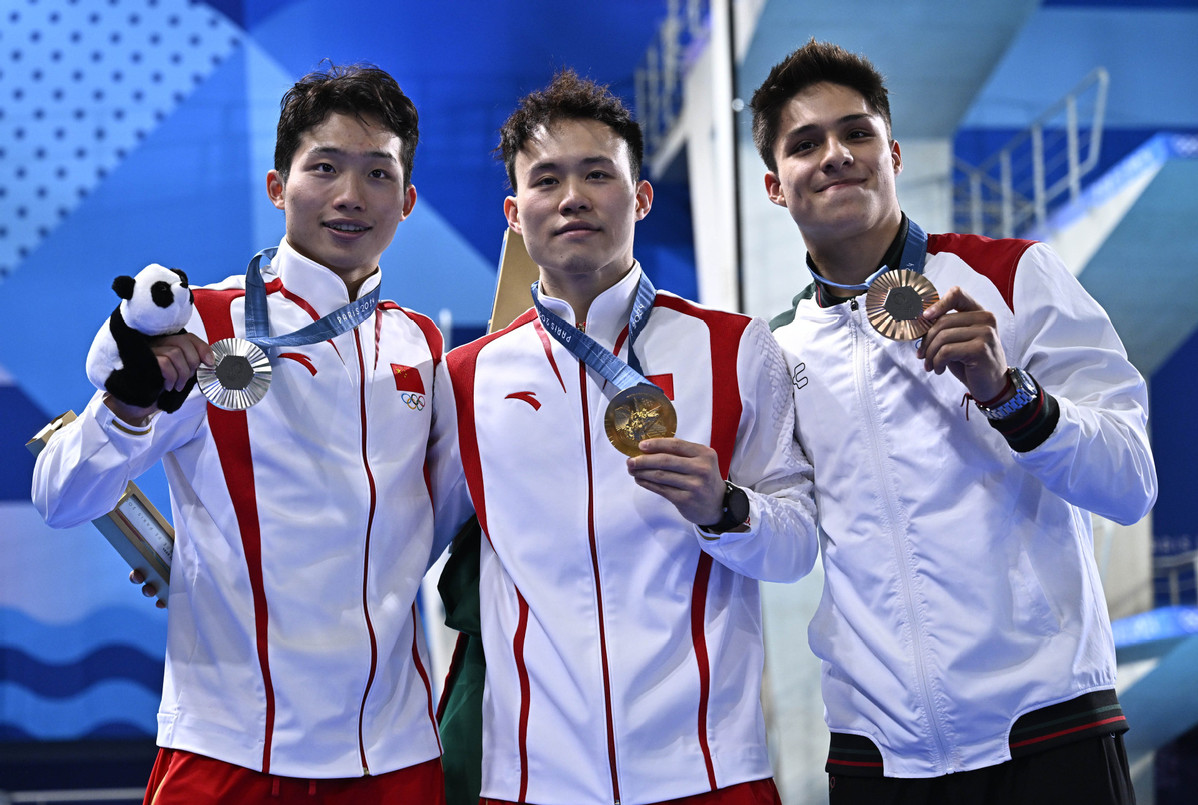
PARIS - China's veteran Xie Siyi bested teammate Wang Zongyuan to defend his title in the men's 3m springboard diving event at the Paris Olympics on Thursday.
Xie, 28, had won both the individual and synchronized events at the Tokyo Games, but only competed in the individual event in Paris.
Despite finishing behind 22-year-old Wang in both the preliminary and semifinal, Xie managed to push himself forward in the final, achieving a winning score of 543.60 points.
"I'm overwhelmed," said Xie, who took a two-year hiatus after the Tokyo Games and faced significant challenges in preparing for the Paris Games due to injuries and fitness issues.
"I didn't perform well in the preliminary and semifinal, I blamed myself for not showing my capability. Then I needed to adjust my mindset in a short time to be ready for the final," he added.
After Wang executed a below-par dive in the fifth round, Xie held his nerve to wrap up his performance with an amazing last dive, earning a high score of 100.70 points.
Wang, silver medalist of this event at the Tokyo Games, earned 1.9 more points than Xie from his sixth dive, but could only finish second again in 530.20.
"I already knew that I could not overtake the top position before the last dive, which actually made me feel calmer than ever," said Wang.
Wang, who claimed the synchronized gold with Xie in Tokyo, defended his title with new partner Long Daoyi on Friday.
"I'm still young and I look forward to coming back stronger four years later," added Wang, having won the event at the last three World Championships.
Mexico's Osmar Olvera Ibarra took the bronze in 500.40.
"I'm happy about everything that happened in this final. I'm happy about the medal," said the 20-year-old, who also grabbed a silver in the synchronized event in Paris.
"Olympics was one of my goals. I knew we could do it and I'm very happy about it," he said.
China's diving team has taken all six gold medals so far at Paris 2024, with two events still to go.
Deng Zhijian, Xie Zhenye, Yan Haibin, and Chen Jiapeng of Team China advanced to the final of the men's 4x100m relay after finishing first with a time of 38.24 seconds in the second heat in round 1 at the Paris Olympic Games on Thursday.
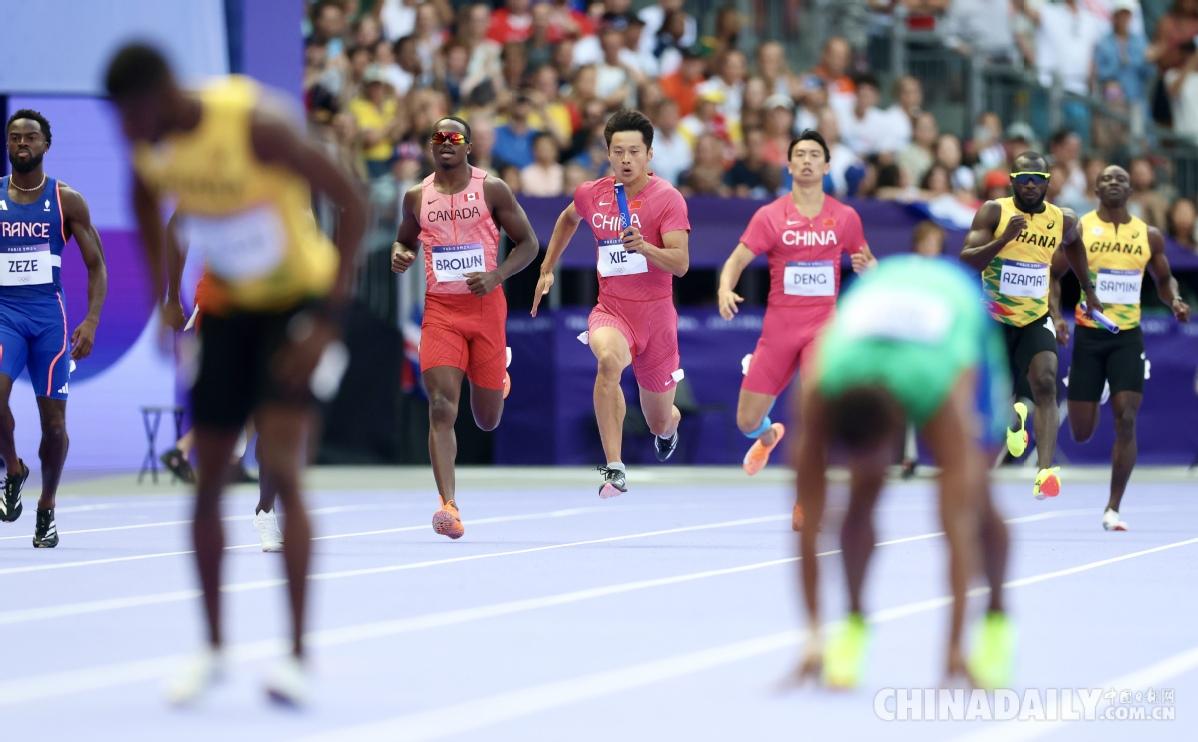
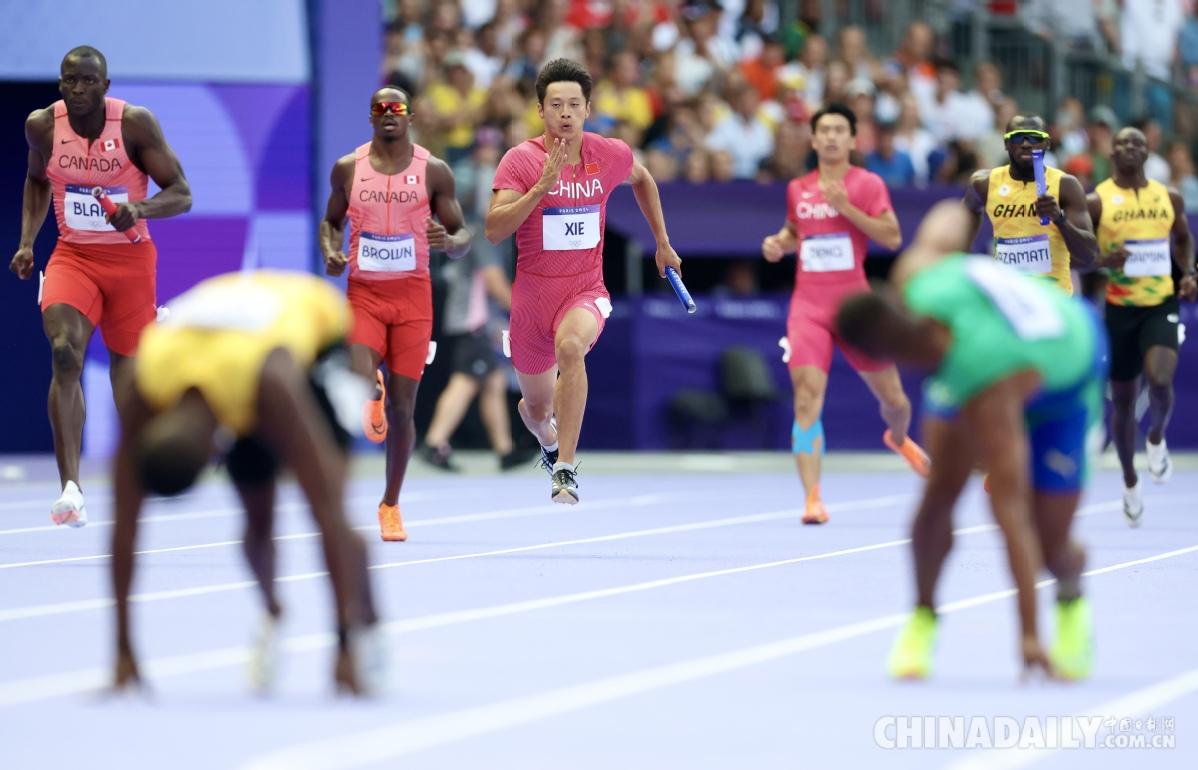
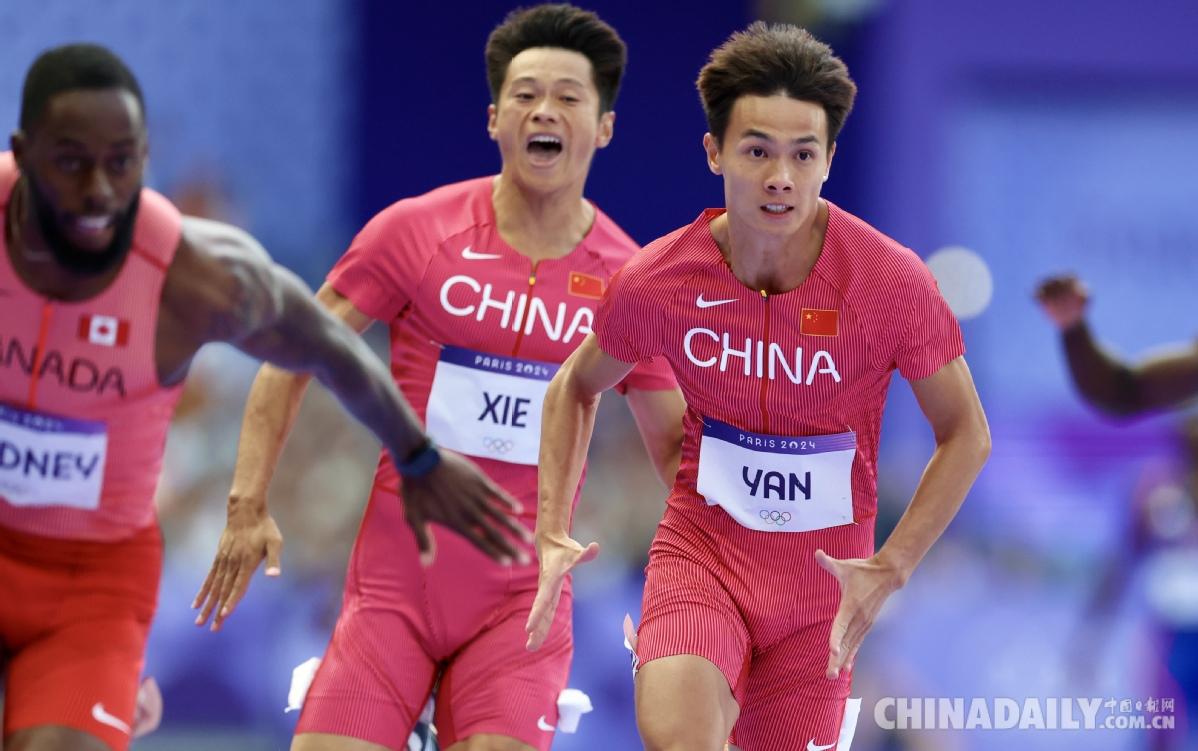
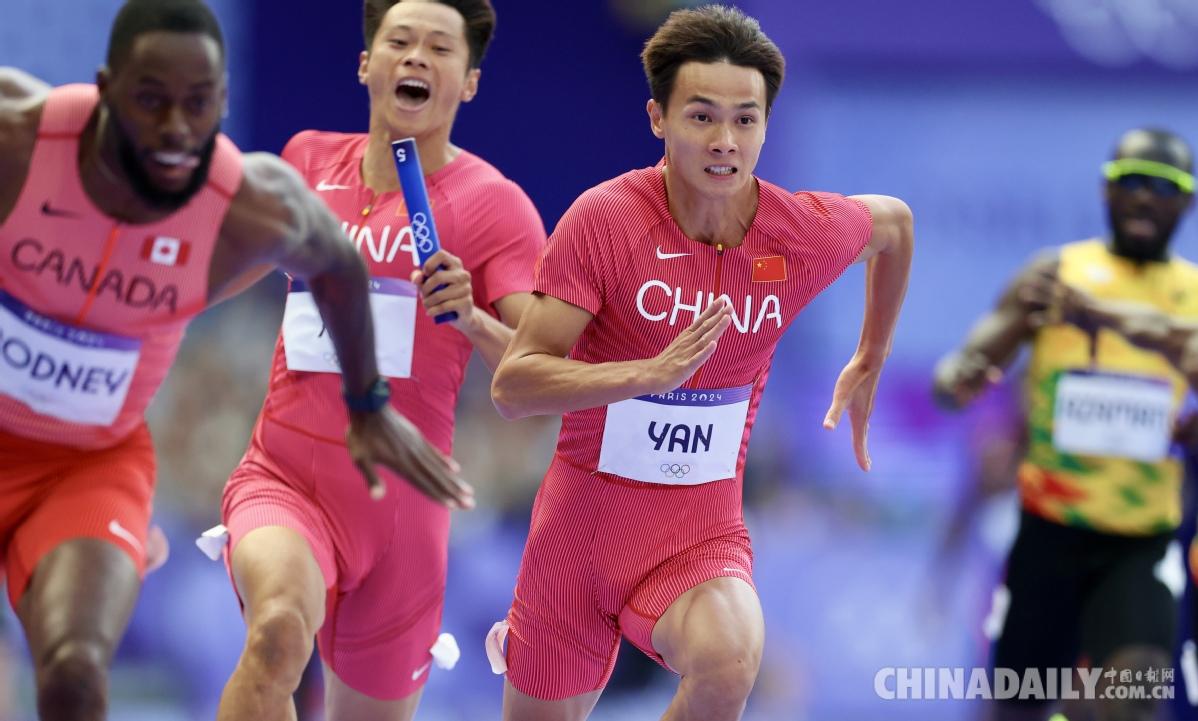
China's Wu Yanni recorded a time of 12.98 seconds in the women's 100m hurdles repechage round on Thursday in the athletics competition at the Paris Olympic Games, failing to advance to the semifinals.
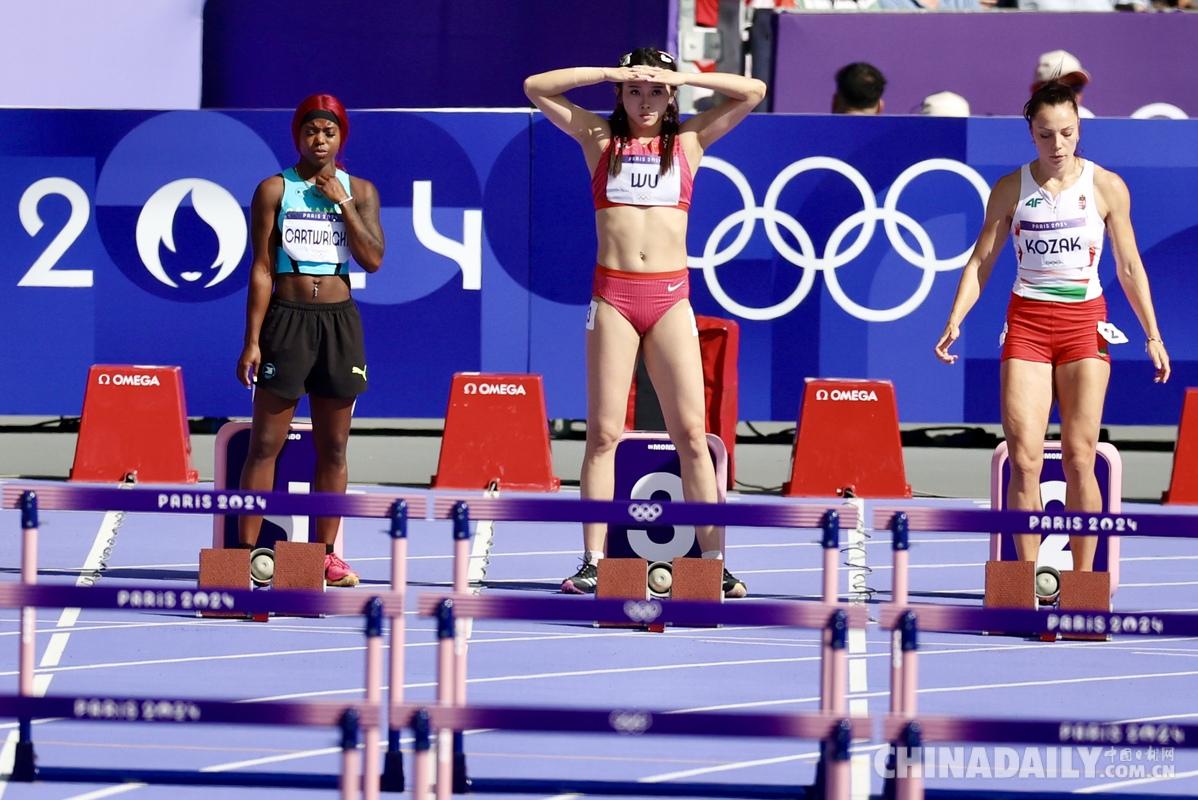



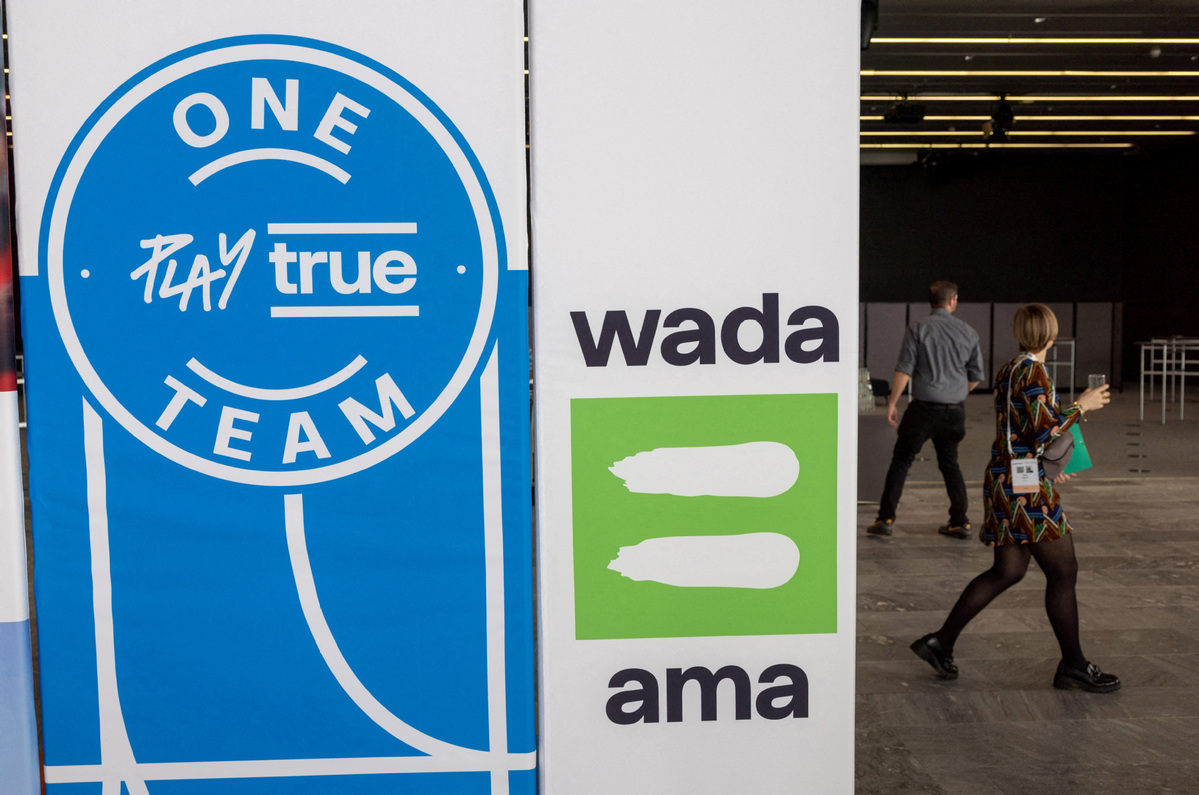
The China Anti-Doping Agency (CHINADA) called on Thursday for an independent investigation into the United States Anti-Doping Agency's cover-up of anti-doping rule violations after the World Anti-Doping Agency said that USADA broke the global code by letting several athletes violating drugs rules go unpunished and kept on competing without prosecution in exchange for information on other violators.
WADA said in a statement on Wednesday that it did not sign off on the practice of permitting drug cheats to compete for years on the promise that they would try to obtain incriminating evidence against others.
When WADA eventually found out about this non-compliant practice in 2021, many years after it had started, it immediately told USADA to desist, it said.
In one case, an elite athlete, who competed at Olympic qualifier and international events in the US, admitted to taking steroids and erythropoietin drugs yet was permitted to continue competing all the way up to retirement. The case was never publicized, results never disqualified, prize money never returned, and no suspension ever served.
It's ironic and hypocritical that USADA cries foul when it suspects other anti-doping organizations are not following the rules to the letter while it did not announce doping cases for years and allowed cheats to carry on competing, WADA said.
CHINADA said in a statement released on Thursday afternoon that such practice of USADA causes severe damage to the rights and interests of clean athletes and to the fair play principle in sport, and shows a profound lack of transparency in USADA's anti-doping work.
The move is, in effect, a cover-up of anti-doping rule violations under the guise of undercover informant, CHINADA said.
It added that it strongly calls for an independent investigation into USADA for covering up anti-doping rule violations. Also, it should immediately disclose the details in relevant cases.
It was the third statement issued by CHINADA this week urging the US to drop double-standard when dealing with the anti-doping cases of athletes from the US and other countries and focus on handling its own doping problem.

PARIS -- China's Liu Hao and Ji Bowen claimed the men's canoe double 500m gold medal at the Paris Olympics here on Thursday.
The pair clocked one minute and 39.48 seconds, ahead of Italy's Gabriele Casadei and Carlo Tacchini who took the silver in 1:41.08. The bronze went to Joan Antoni Moreno and Diego Dominguez from Spain who finished in 1:41.18.

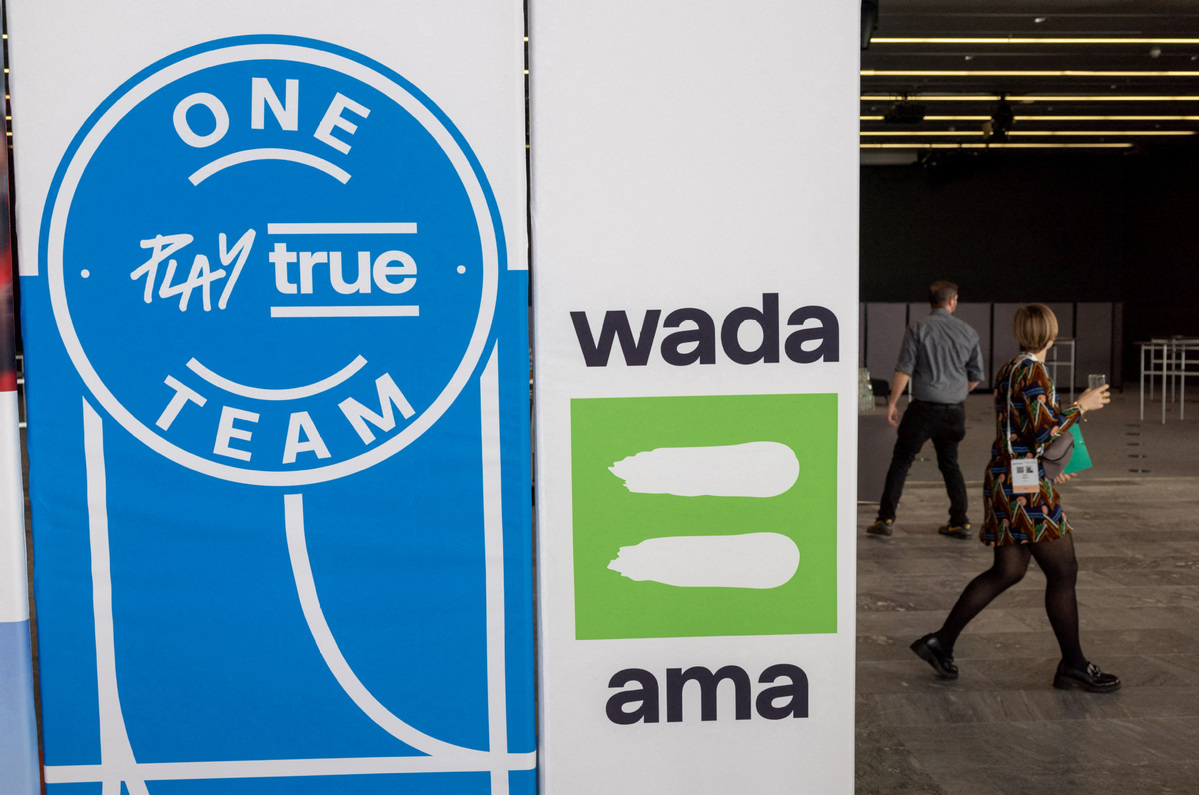
OTTAWA - The World Anti-Doping Agency (WADA) has issued a stern rebuke to the US Anti-Doping Agency (USADA) following revelations by Reuters on Wednesday, exposing a scheme that allowed US athletes who had committed doping violations to compete without sanctions for years.
WADA noted in a statement that this practice is a blatant violation of the World Anti-Doping Code and USADA's own regulations.
WADA highlighted the severity of the allegations, which suggested that USADA permitted doped athletes to compete, including in Olympic qualifiers and international events, without publishing their anti-doping rule violations or imposing any sanctions. This, WADA asserted, undermined the integrity of sporting competition and is a clear breach of both international and USADA's own anti-doping rules.
WADA denied any involvement or approval of this practice.
"Contrary to the claims made by USADA, WADA did not sign off on this practice of permitting drug cheats to compete for years on the promise that they would try to obtain incriminating evidence against others," WADA said in the statement.
The World Anti-Doping Code does have provisions for reducing suspensions for athletes who provide substantial assistance, but WADA emphasized that this process does not permit athletes to continue competing while potentially still benefiting from performance-enhancing substances.
"When WADA eventually found out about this non-compliant practice in 2021, many years after it had started, it immediately instructed USADA to desist," the statement read.
WADA's investigation has so far identified at least three cases where athletes who had committed serious anti-doping rule violations were allowed to continue competing for years as undercover agents for USADA. In these instances, USADA failed to notify WADA, as required, and there were no provisions under the Code or USADA's rules that allowed such a practice.
One case involved an elite athlete who admitted to using steroids and EPO but was allowed to compete up until their retirement. This athlete's results were never disqualified, and their case was never made public. USADA argued that publishing the athlete's doping violations would endanger their security, forcing WADA to reluctantly agree to non-publication after confirming the security threat was credible.
In another case, a high-level athlete had their provisional suspension lifted by USADA without WADA's knowledge, which is an appealable decision.
"Had WADA been notified, it would never have allowed this," the statement read.
WADA's statement also raised concerns about the broader implications of these actions, questioning the fairness and integrity of competitions where clean athletes unknowingly competed against those who had been allowed to cheat. WADA criticized USADA's apparent double standard in enforcing anti-doping rules and called into question whether USADA's Board of Directors or the US Congress, which funds USADA, were aware of these practices.
"How must other athletes feel knowing they were competing in good faith against those who were known by USADA to have cheated?" WADA's statement asked.
"It is ironic and hypocritical that USADA cries foul when it suspects other Anti-Doping Organizations are not following the rules to the letter while it did not announce doping cases for years and allowed cheats to carry on competing, on the off chance they might help them catch other possible violators."

The China Anti-Doping Agency on Thursday called on the International Testing Agency to intensify testing on US athletes, especially those who compete in track and field, and rebuild global trust after US Olympic sprinting star Erriyon Knighton tested positive for banned steroid trenbolone during an out-of-competition test in March 2024.
Knighton was later unilaterally exonerated by the United States Anti-Doping Agency and was allowed to eventually represent the US at the Paris Olympics.
CHINADA said in a statement issued on Thursday that the case has been widely reported by media at home and abroad, after which the USADA made a public statement on the case, which claims that trenbolone is a common contaminant in the US.
In fact, hundreds of positive tests for trenbolone have taken place in recent years worldwide, but only a very small number of US athletes have escaped sanctions based on the USADA's investigative findings and claims of meat contamination, it said.
Knighton, 20, tested positive for trenbolone, a banned steroid, during an out-of-competition test on March 26. But the USADA decided before the start of the domestic qualifiers for the Paris Olympics that no ineligibility would be imposed on him, claiming that the positive result was caused by the consumption of contaminated meat, the CHINADA said in a statement published on Tuesday.
Knighton's case once again put doping scandals in the US under a spotlight. Such scandals have been too common in US athletics, and the USADA's handling of such cases has been inconsistent and questionable, the CHINADA said.
According to public information, Carl Lewis, a nine-time US Olympic gold medalist, once acknowledged that despite testing positive three times before the 1988 Seoul Olympics, he was eventually "let off the hook" and represented the US in Seoul.
Olympic 100m champion Justin Gatlin, who failed two doping tests and should have been banned for life according to relevant rules, was ultimately given a four-year suspension after the USADA's exculpatory efforts.
And in 2003, the Bay Area Laboratory Co-operative in San Francisco was embroiled in a shocking doping scandal. Victor Conte, founder of the now-defunct sports nutrition center, provided a list of professional athletes who bought performance-enhancing drugs from the company, including Olympic track stars Gatlin, Marion Jones and Tim Montgomery.
The BALCO scandal triggered widespread concerns from the international community about doping in the US sports industry.
Gil Roberts, who was part of the US 4x400 relay team that won gold at the 2016 Rio Olympics, was found to have a banned diuretic and masking agent in his system but was cleared by USADA in 2017 by claiming that the positive test result was caused by him kissing his girlfriend, who had been using a sinus medication that contained the drugs.
Roberts then tested positive for banned substances andarine and ostarine in 2022 and was given a 16-month suspension. Just eight months after his return in 2023, he failed another drug test and was given an eight-year ban.
In April this year, US track athlete Aldrich Bailey tested positive for ostarine during an out-of-competition test. The USADA ruled that the positive test was due to contaminated neoprene hamstring sleeves commonly used by athletes, though ostarine is not a common contaminant, facts show.
Given the deep-rooted problems in US athletics and the USADA's repeated disregard for procedures and standards, there is reason to suspect that there is a systemic doping problem in track and field in the US, and the positive cases therein deserve continuous investigation and attention, CHINADA noted in the statement.
CHINADA strongly urged the ITA to intensify testing on US track athletes and recommend that the Athletics Integrity Unit strengthen its anti-doping supervision of the sport to protect the legitimate rights and interests of athletes who compete fairly and to rebuild trust in athletes worldwide.

PARIS - Panipak Wongpattanakit of Thailand successfully defended her taekwondo women's 49kg gold medal on Wednesday at the Paris Olympics, while South Korea's Park Tae-joon clinched gold in the men's 58kg category.
Wongpattanakit, who celebrates her 27th birthday on Thursday, secured her second consecutive Olympic gold. This marks her third Olympic appearance, having previously taken bronze at Rio 2016 and gold at Tokyo 2020. The two-time world champion confirmed this would be her final Olympics due to injuries.
On her path to victory, Wongpattanakit defeated Morocco's Oumaima El Bouchti, Saudi Arabia's Dunya Ali M Abutaleb, and Croatia's Lena Stojkovic. In the final, she overcame China's Olympic debutant Guo Qing 6-3, 2-3, 6-2.
Guo secured silver, while Iran's Mobina Nematzadeh and Stojkovic shared bronze medals.
Park Tae-joon, 20, reigning world champion in the men's 54kg, defeated Venezuela's Yohandri Granado, France's Cyrian Ravet, and Tunisia's Mohamed Khalil Jendoubi to reach the final.
In the gold medal match, Park faced Azerbaijan's Gashim Magomedov, who suffered a leg injury during the first set. Despite his efforts to continue, the Azerbaijani had to retire in the second set while Park was leading 13-1.
Ravet and Khalil Jendoubi jointly claimed bronze medals.
The taekwondo events are held from August 7 to 10, featuring the men's 68kg and women's 57kg competitions on Thursday.
Chinese pianist Lang Lang, who was a torchbearer at the Paris Games, sat down for an exclusive interview with China Daily online show Tracking Success. Lang said this was the fourth time he participated in the torch relay in the Olympics. Since the 2008 Beijing Games, he also took part in the torch relay at the London Olympics in 2012 and the Rio Olympics in 2016. Among all the Games he has ever attended, the 2008 Beijing Olympics remains the most memorable experience, especially as he was also an opening ceremony performer. To walk down Lang's Olympic memory lane together, click the video.

Quan Hongchan of China not only won her second gold medal in diving at the Paris Olympics on Tuesday, she did it with a perfect score of 10 on her first of five dives.
The dive was a forward 3-and-a-half somersaults, hardly making a ripple and setting off wild cheers from the fans as the seven judges all registered scores of 10.
"I believe scoring 10 is unbelievable," Quan said through an interpreter. "The feeling was super."
The 17-year-old, a three-time world champion, said she had scored 10 three times before — including twice while winning gold in Tokyo.
China's Chen Yuxi took silver, a repeat of the duo's finish three years ago in Japan. Kim Mi-rae of the Democratic People's Republic of Korea won bronze, adding to the silver medal she claimed earlier in women's 10-meter synchronized, which was the country's first medal ever in Olympic diving.
Quan scored 425.60 points on five dives, compared with 420.70 for Chen and 372.10 for Kim. Caeli McKay of Canada was fourth with 364.50 points.
The two Chinese women teamed up earlier to win gold in the 10m synchronized.
Kim began crying after her final dive, and it was unclear if she was celebrating or feeling disappointed.
"When I realized this was the bronze medal, when I realized I wasn't able to do better, I felt sad," Kim said through an interpreter. "That's why I teared up. The medal is going to be significant for the nation. It's going to be a very small corner of a page in the history of the country."
She added: "Although it's a bronze, I am very happy to be able to bring a medal back home."
China is aiming for an unprecedented sweep of the eight diving golds. The Chinese so far have won five, after winning the four synchronized competitions in the opening week of the Games.
Quan, who stands at just 150 centimeters, was asked if she would return for the 2028 Los Angeles Olympics.
"The future should be thought about in the future," she said. "I should live in the present."
Quan and Chen had big leads over the field after the preliminary round on Monday, but those scores do not carry over to the final. It didn't matter. They piled up the same margin on Tuesday.
Quan was asked most of the questions, but Chen waited her turn to make a point — also through an interpreter.
"We fight for our country, we never fight for ourselves," she said. "If she (Quan) wins gold, or I do, it is only for China. As long as the gold is won by China, it doesn't really matter."
Chinese divers Wang Zongyuan and Xie Siyi topped the preliminary round of the men's 3m springboard on Tuesday. Wang scored 530.65 and Xie recorded 509.60.
Jack Laugher of Britain was third (468.30) and countryman Jordan Christopher Houlden was fourth (448.20).
The top 18 advanced to Wednesday's semifinals. The final is on Thursday.
Agencies via Xinhua
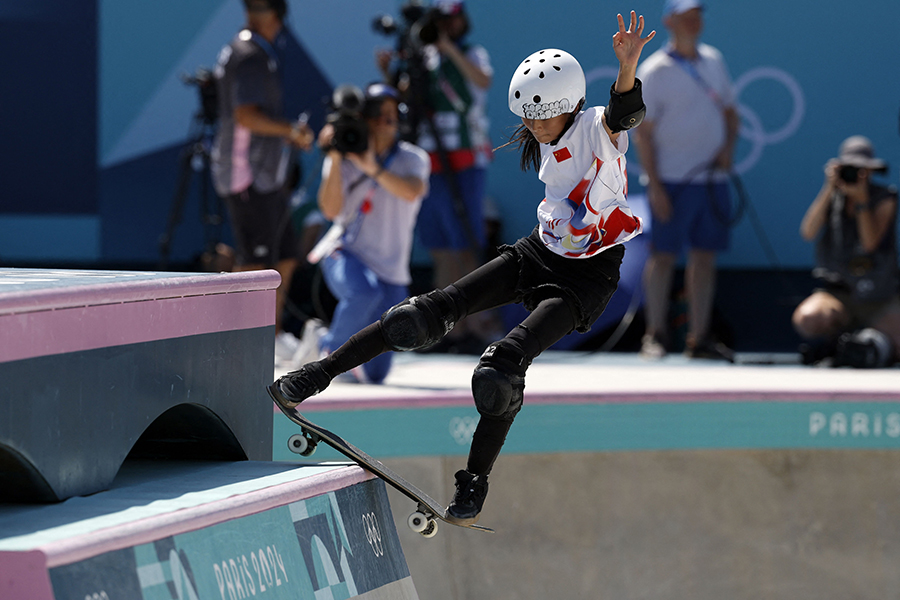
Dropping in with ease and grace, Zheng Haohao seemed as relaxed as when she skates at a park near her home; smoothly working through her lines to pull off a few glides and spins across the bowl, before fist-bumping with other skaters at the end of her run.
It all seemed to be business as usual on Tuesday afternoon, like just another day of skating for Zheng — if it were not for the rousing cheers from a capacity audience and the five Olympic rings adorning the bowl at the iconic Place de la Concorde in the heart of Paris.
She was just living her dream, and, in doing so, the Chinese prodigy has etched her name into Olympic history in the French capital.
At just 11 years and 360 days old when she took her first run on Tuesday, Zheng became the Paris Games' youngest competitor across all sports, and the youngest to ever represent China at the Olympics since the country's debut in 1984.
To put it into perspective, Zheng has just completed her primary school studies and is now making her Olympic debut, enjoying perhaps the coolest graduation trip among all her classmates, and, for sure, the best birthday party ever, as she turns 12 on Aug 11 — the day of the closing ceremony.
And as for the result? She doesn't seem too bothered about it, nor the massive amount of attention that has come flooding her way.
"I just relaxed, chilled out and tried to put on my best performance and, most importantly, enjoy the experience," Zheng, wearing a white helmet with cartoon graffiti, said in a calm tone after her qualification round.
"Skateboarding at the Olympic Games isn't much different from skateboarding in my neighborhood. There are just more spectators.
"I'm not too nervous, because being nervous isn't helpful. It can lead to mistakes. I try to stay relaxed and think about the fun I'm going to have in this competition."
Before Zheng, the youngest athlete to represent the Chinese delegation at the Olympics was teen swimmer Nian Yun, who competed in the women's 4x100m freestyle relay at 13 years and 287 days old at the 1996 Games in Atlanta, in the United States.
The park discipline of skateboarding involves athletes skating across a hollowed-out concrete bowl and performing a variety of tricks using different elements, such as ramps, quarter-pipes and bumps, to accumulate as high a score as possible in each 45-second run.
As passionate about skating as any of her senior counterparts, it was Zheng's lack of strength and speed at such a tender age that cost her in both routine execution and quality. She completed only her first run of the three attempts each athlete is allowed in the qualification round, ranking 18th among all 22 entries with a first-attempt score of 63.19 points.
She missed the top-8 cut for the final, as expected, but has gained a lot more than just an opportunity to take three more runs.
"I made new friends that I wouldn't have met in classrooms, exchanged a few pins and learned some new tricks from all the other older girls competing here," Zheng said of her Paris adventure.
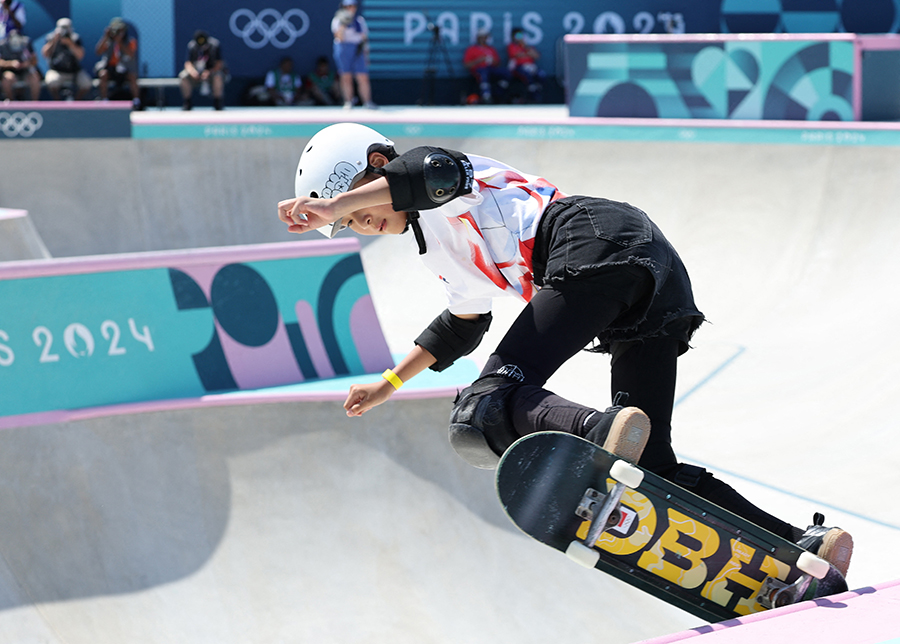
Only the start
As most young girls of her age, Zheng's extracurricular activities were more traditional, such as learning piano and painting, but nothing seemed to capture her imagination quite as much as the skateboard and helmet her mother bought her for her seventh birthday.
Since she tried skating for the first time, Zheng, who always climbed rocks when she was little, has done little else with her free time, her mom recalled.
Two years into her part-time skateboard training, Zheng had already made it to the 2021 National Games, which is when she realized that she could skate on a higher stage as the sport made its Olympic debut in Tokyo.
Zheng's talent and passion drove her to her first gold medal win in an official competition — a women's B group bowl event at the provincial games in her native Guangdong in August 2022 — paving the way for her to be drafted into the national program for Paris 2024.
Her meteoric rise, following two impressive Olympic Qualifier Series events in Shanghai and Budapest earlier this year, propelled Zheng to 26th in the Olympic rankings, helping her eventually qualify for the top-22 Paris roster, after higher-ranked girls from Japan, Brazil and the United States missed out due to their respective NOCs' full-quota status.
Peeling back all the buzz around her age, you'll find just a typical skater having fun on a skateboard, said Zheng's coach Danny Wainwright, a professional skater from Bristol, England.
"There's no difference. She does it for fun. She loves it. She skates because she wants to skate and she enjoys it," Wainwright told China Daily from the sideline of Tuesday's Olympic run.
Given her huge potential physically and technically, Wainwright predicts only great things for Zheng, as long as she keeps riding for fun and in the right direction.
"When I started working with her, she needed guidance. She had some bad habits and she didn't know how to plan for runs," said Wainwright, who started working with Zheng before an Olympic qualifier in Dubai in March.
"You should know the approach, how to put the run together, how to design a run, making the most of the 45 seconds you have in the park. I enjoy working with her on stuff like that and (competing at the Olympics) obviously helps," Wainwright said.

At the opening ceremony of the Paris Games, a female knight in gleaming silver armor, draped in the Olympic flag, made a grand entrance on a white horse. Riding across the Seine River with the flags of competing nations fluttering behind her, she was strength and elegance incarnate.
Her courageous and graceful demeanor was merely a precursor to the resilience, glory and embodiment of the Olympic spirit displayed by a pantheon of female athletes who have dazzled the world in the past 10 days. However, it's not just their outstanding performances and skills that have captured spectators' attention, but also their elegant makeup, intricately styled hair, and even artistically painted nails — juxtaposing not only the unique power, but also the delicate beauty of women athletes.
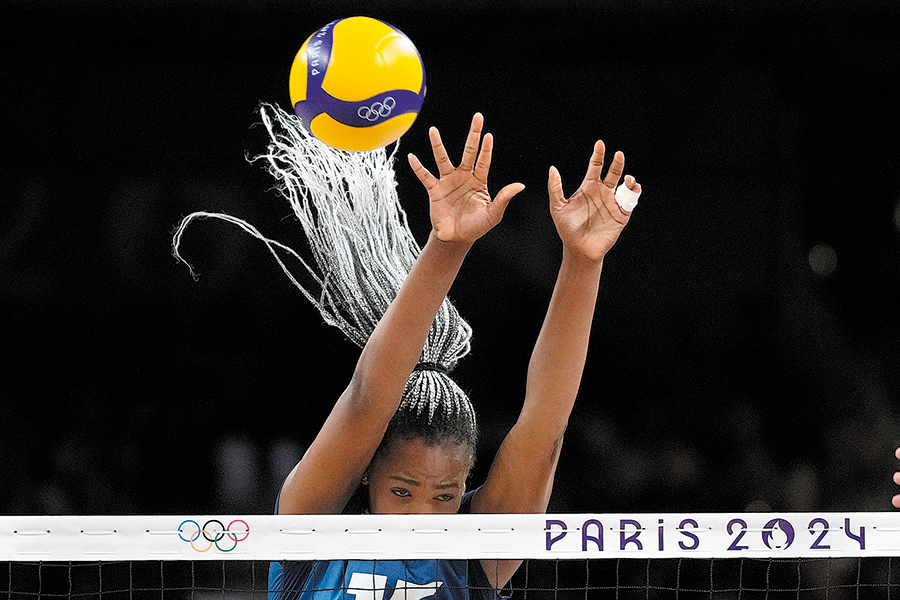
While it's commonplace to see women shining on the Olympic stage today, little over a century ago, they were not even allowed to compete. Their journey to reach this sporting pinnacle has been long and arduous — more akin to a marathon than a sprint — and it began in Paris in 1900, when women competed in the Olympics for the first time.
Now, a century-and-a-quarter later, Paris is again laying down another Olympic milestone for female athletes. The International Olympic Committee has ensured that approximately half of the 10,500-athlete quota are women — meaning that Paris 2024 is the first time in history an almost equal number of men and women are competing at a Summer Games.
The final registered numbers released by the IOC show that 5,712 male athletes and 5,503 female athletes are on a quest for gold this year, compared to the just 22 women and 975 men who participated in 1900.
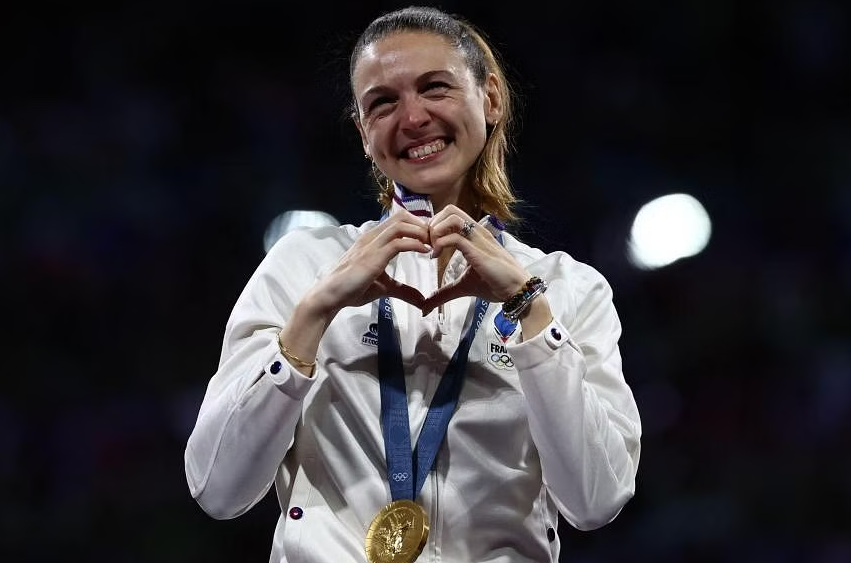
"In Paris, we are seeing the results of the enormous efforts made by the Olympic movement and female trailblazers come to fruition. This is our contribution to a more gender-equal world," said Thomas Bach, IOC president.
In Paris, for the first time since its inclusion in the Olympic program in 1984, the women's marathon will conclude the athletics schedule and highlight the achievements of female athletes just before the closing ceremony. For Paris 2024, this is especially significant as the marathon route will honor the historic Women's March of 1789.
Cassandre Beaugrand from France, the world's top-ranked triathlete, won the women's individual triathlon gold medal at the city's Pont Alexandre III on July 31.
"To do it in front of our crowd was something that had to be done, and I still can't believe it," she said, "I'm happy that my mentality was on point today and, ultimately, my greatest strength."
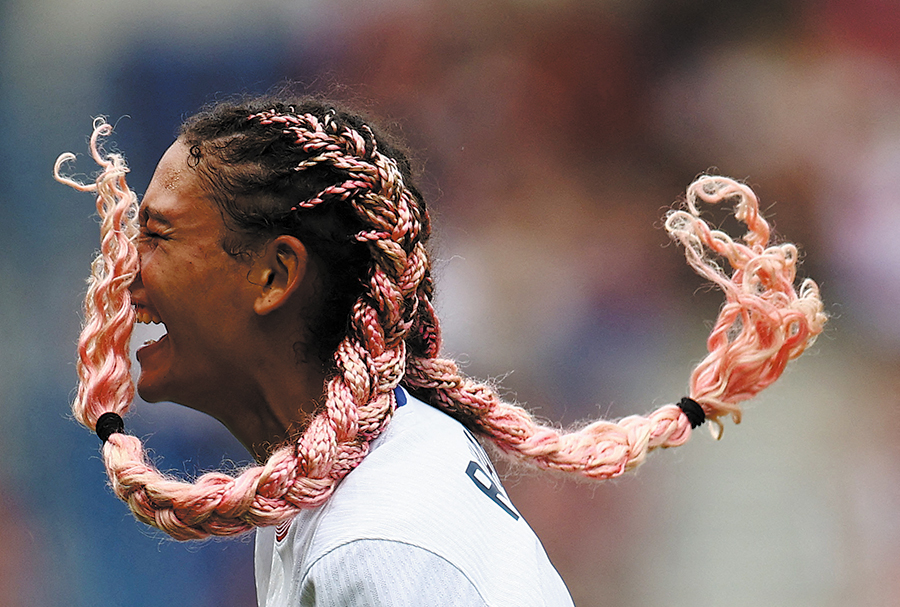
From swimming in the Seine, to biking along the Champs-Elysees, Paris has so far offered a breathtaking backdrop for female athletes to deliver stunning performances.
Remarks about the Games from Yu Jia, a commentator for Chinese national broadcaster CCTV, have struck a chord on Chinese social media.
"You should be able to see the immense beauty in their performance. Their bodies are forged from steel, their spines etched with courage and their blood infused with freedom. Each athlete embodies adventure, defiance, and fearlessness," he said. "In such competitions, both a girl's heart and a knight's spirit can coexist."
Yu emphasized the significance of the event, noting that "you never know where in the world a young girl might be watching, dreaming of one day standing on such a stage".
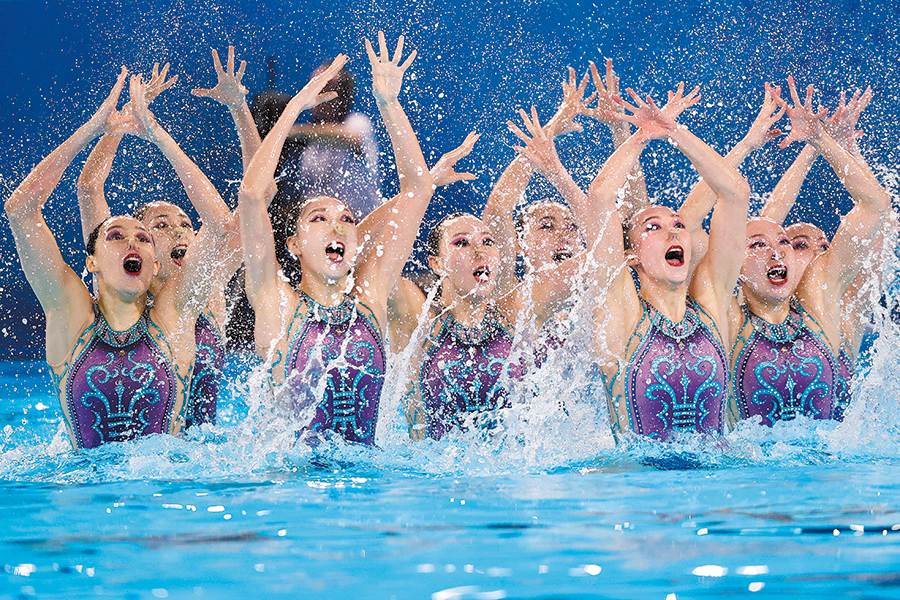


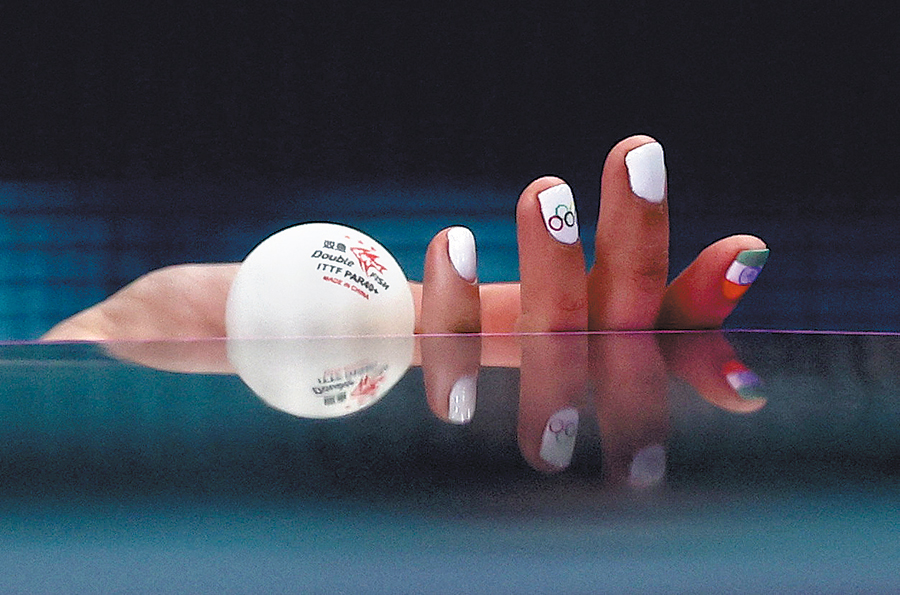
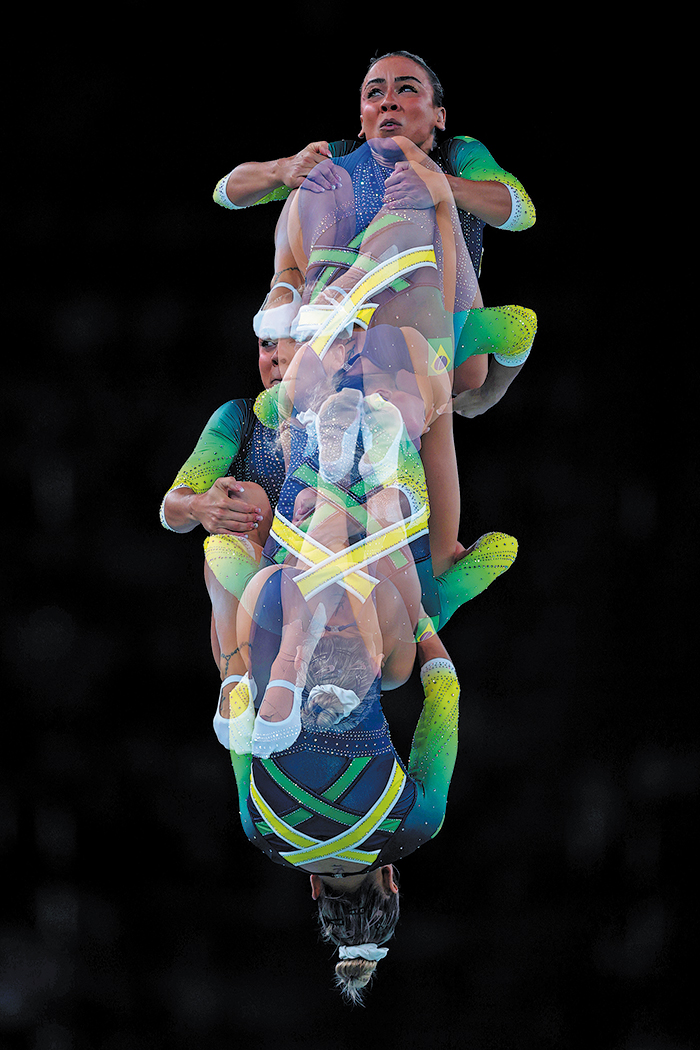
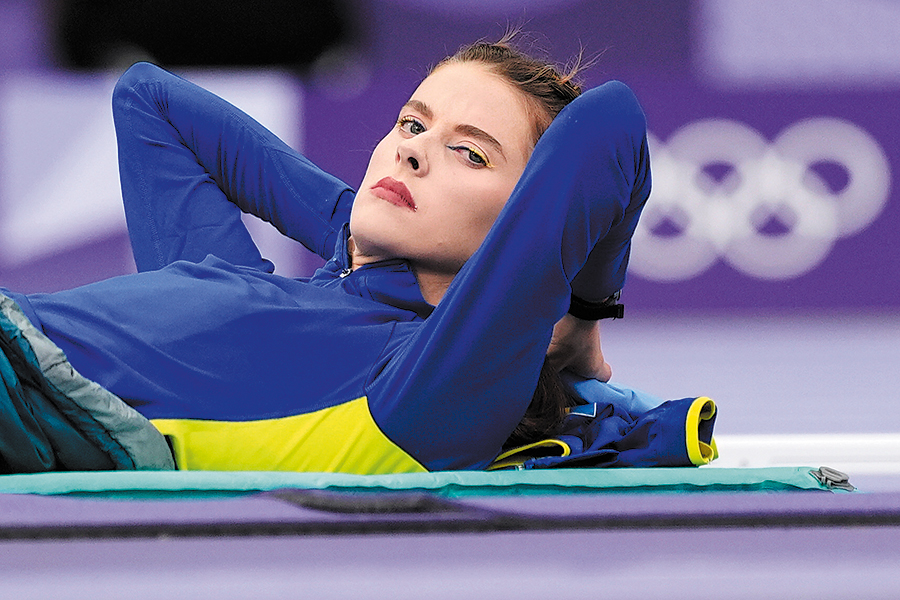


Every day, the Kung Fu Daoxiaomian restaurant, located next to the Notre Dame cathedral in Paris, draws long lines of visitors looking for a serving of its daoxiao mian, or knife-cut noodles — a dish that bears testimony to the rich culinary heritage of North China's Shanxi province and the region's generations of skilled noodle masters.
Many residents and tourists are curious to have a taste of this special variety of Chinese noodles, making the restaurant a popular check-in spot in the French capital amid the Olympic Games. Even two-time Olympic flyweight champion Zou Shiming visited.
Little wonder that the restaurant's 36-year-old owner, Guo Zhanglong, has nearly 10 million followers on Chinese social media platforms, including Douyin, Kuaishou and Xiaohongshu.
"I truly want to promote the excellence of traditional Chinese cuisine and culture in Europe, and a bowl of noodles is more than delicious food. It also signifies mutual recognition, understanding and inclusivity," he said.
Guo, who was born in Yantai, East China's Shandong province, studied in France as an exchange student in 2011.
"I was both studying and working part time, while seeking business opportunities in Paris. I tried various odd jobs, including washing dishes in restaurants and delivering parcels," he said.
In 2012, Guo met a Chinese woman from Shanxi in Paris and they fell in love. The couple tied the knot in 2015.
"We went through some hard times together. We tried several businesses to improve our life — tourism, foreign trade, catering — but the situation didn't change much," he recalled.
At the end of 2019, Guo caught the rising wave of homemade short videos and established his own social media account. He began recording his experiences in France. His early content described the delicious food he was tasting, and followers came on board fast.
At the beginning of 2020, Guo's mother-in-law, Sun Shenglin, came to France for a visit from Datong, Shanxi. She could not return to China as scheduled due to the COVID-19 pandemic, and her rich experience in the catering industry brought Guo luck.
Sun, a skilled knife-cut noodles master, won great praise from her son-in-law's friends and neighbors in Paris.
During Spring Festival in 2022, Guo organized a celebration that attracted more than 200 people. "We prepared a lot of Chinese dishes, but it wasn't enough, so my mother-in-law filled the gap by making some knife-cut noodles."
That was the start of a small Chinese miracle in Paris.
To Guo's surprise, his mother-in-law sliced more than 100 kilograms of dough and yet demand exceeded supply. As they watched Sun cut the dough at high speed and send the pieces flying into a pot, the guests likened her to a kung fu master.
At a friend's suggestion the next day, Guo completed the necessary procedures for setting up a stall to sell knife-cut noodles at an outdoor market in Paris. He decorated it with elements of Chinese culture, quickly making it the most eye-catching stall in the market.
In October last year, Guo opened an authentic Shanxi knife-cut noodles restaurant in central Paris and named it Kung Fu Daoxiaomian. In March, his restaurant opened a second outlet next to Notre Dame, attracting many Chinese and native Parisians.
"In the beginning, we were worried that foreigners might tire of the flavor, and wondered whether we should adjust and improve it slightly," Guo said.
"But my mother-in-law said the noodles have been around for 850 years and are already perfect, so there is no need for any improvement or innovation. We took her suggestion and gained acceptance beyond our imagination."
This year, in conjunction with the 60th anniversary of Sino-French diplomatic relations and the Paris Olympics, Guo was invited to several exchange activities where he shared his story.
"Currently, our knife-cut noodles have a very promising future in France. They embody the full charm of Chinese cuisine. Two more restaurant sites are undergoing renovations and are expected to open in the near future," he said.
"I hope to promote Chinese cuisine on the global stage. I also believe that with the help of short videos, more talented creators will join us to help Chinese culture go global," he added.
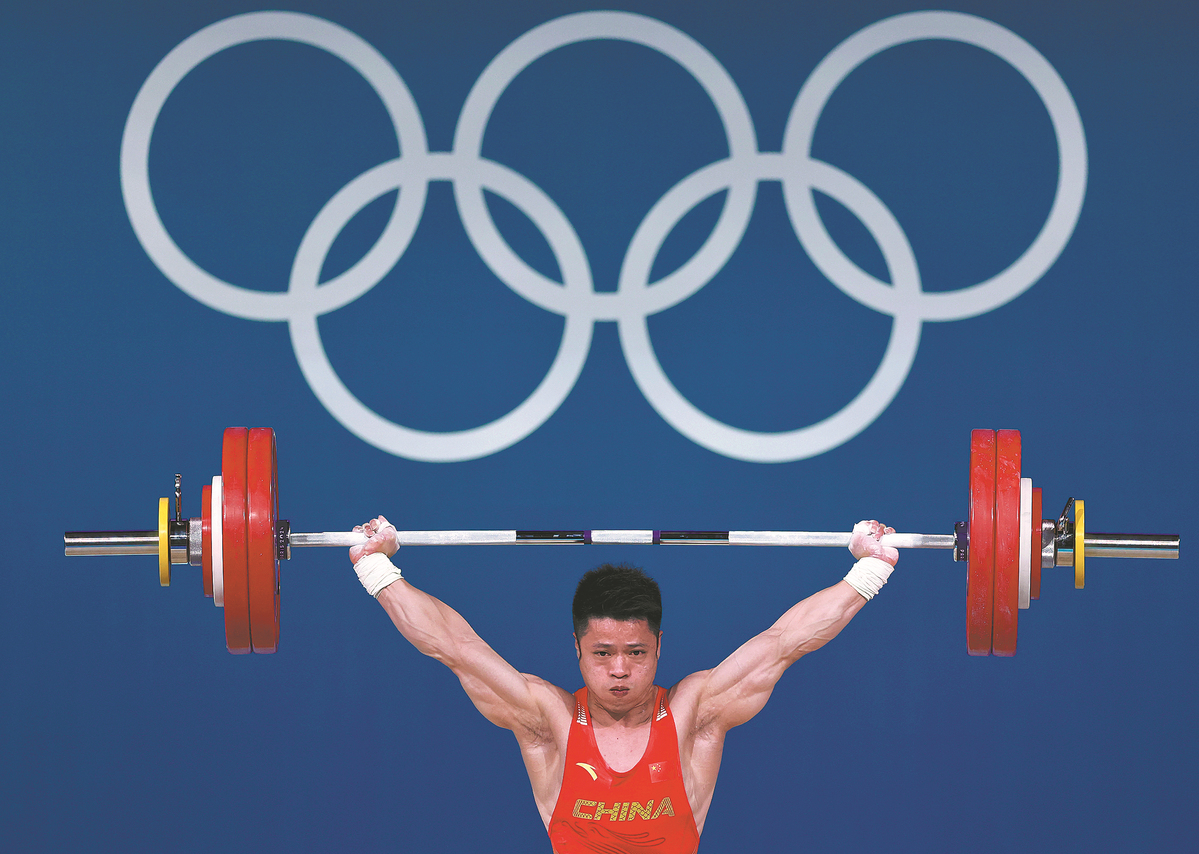
China's Li Fabin defended his Olympic championship on Wednesday in the men's 61-kilogram weightlifting event at the Paris Olympics and won the nation's 23rd gold medal at the Games.
Li, 31, set an Olympic record of 143 kg in the snatch, and lifted 167 kg in the clean and jerk, in the first weightlifting event of the Paris Games.
Theerapong Silachai of Thailand won silver, and Hampton Morris of the United States won bronze.
There was also good news from the sport climbing field on Wednesday.
Chinese speed climber Deng Lijuan won the country's first Olympic medal in the sport in the thrilling women's final, losing by a mere 0.08-second margin to Poland's world record holder Aleksandra Miroslaw.
"I am really satisfied with my performance today," said Deng, who finished in 6.18 seconds, an Asian record time, in the final at Le Bourget Climbing Venue in a northern Paris suburb. "This event is all about challenging yourself constantly, and I am so happy to see that I've improved a lot at this Olympic stage."
The speed discipline involves two climbers ascending the same routes on a wall to finish first by touching the pad in a timed, one-on-one knockout format that leaves no room for even the slightest misstep.
The Chinese Mountaineering Association, the nation's governing body for sport climbing, hailed Deng's performance in the final as a shining example for Chinese youths.
"Nothing is too difficult as long as you dare to climb," the association said in a congratulatory letter. "Deng has lived up to the spirit of mountaineering and sport climbing by tenaciously fighting against challenges and always thriving to scale new heights."
As the undisputed favorite in the women's event, Miroslaw had twice broken her own world record, which stood on Monday at 6.06 seconds. Deng also improved her personal best twice en route to the final.
US urged to honor promise
Meanwhile, Gao Zhidan, president of the Chinese Olympic Committee, called on Tuesday for his United States counterpart to honor the US promise to comply with the World Anti-Doping Code and to urge US federal authorities to stop interfering in cases and disputes that are beyond their jurisdiction.
"As two Olympic sports powerhouses, China and the US share the responsibility to honor principles of the Olympic Charter, build and develop a unified world anti-doping system and defend clean athletes' rights together," Gao told Gene Sykes, chairman of the United States Olympic and Paralympic Committee, during their meeting on Tuesday, according to China Sports Daily.
"We support the US organizers' hosting of the 2028 Los Angeles Summer and 2034 Salt Lake City Winter Olympic Games. Yet we hope the US authorities will stop the 'long-arm' jurisdiction and guarantee the security of athletes from around the world, including China, when they visit the US for training and competitions," Gao said.
A series of groundless accusations by US media and US anti-doping authorities targeting Chinese swimmers, who have been cleared of any wrongdoing in a proven food contamination incident in 2021, seriously affected the Chinese athletes' preparations for the Paris Games.
The US anti-doping agency, despite having no evidence, has called the World Anti-Doping Agency's no-fault verdict in the contamination case a "cover-up "and lobbied for a US investigation of the case.

Underrated and overlooked, the Chinese women's field hockey team has made its presence felt big-time at the pinnacle of the sport by upsetting European power Belgium in a dramatic semifinal to advance into its first Olympic final in 16 years.
Entering Wednesday's semis against the world No 3 team, the Chinese squad put up a gutsy fight as resiliently as it has been fighting at these Games, starting strong with a second-quarter goal from Zou Meirong and staying composed after an equalizer scored in the dying minutes by Belgium's Emma Puvrez tied the match 1-1 at the end of regulation.
After conceding two goals first in the nerve-wracking shootout, Team China kept its cool to score three back in a row. Goalkeeper Ye Jiao then rose to the high-stakes occasion, denying the Belgians' next three attempts with marvelous saves to secure Team China a final berth for the first time at an overseas Olympic Games.
The last time China reached an Olympic final was at Beijing 2008 on home soil.
As the lowest-ranked team in the semis at world No 6, Team China will continue fighting for a triumphant sequel to its David-vs-Goliath heroics when it challenges world No 1 the Netherlands in the Friday final at the Yves-du-Manoir Stadium in western Paris suburbs.
Team China's head coach Alyson Annan, an Australian legend in the sport, said her girls will approach the final totally pressure-free.
"(We have) everything to win and nothing to lose," Annan, a two-time Olympic champion as a player, said after Team China's thrilling shootout win against Belgium on Wednesday.
"We talked about this all the time since I started. We want to win a medal. We want to be on the podium in Paris. I almost say that at every single training. This is why we do this and we have to do this," Annan said of the confidence and mental strength she's installed within the team since she took over the Chinese program in 2022.
After all the country's other collective ball-sport teams crashed out of the Paris Games, the Chinese women's hockey squad has provided the whole delegation with a morale boost by securing at least a silver medal in Paris.
"Hopefully what we did here could bring more attention to the sport in China, inspiring more girls to pick up a hockey stick and give it a try. This means everything for the sport's profile and for everyone on the team," Chinese captain Ou Zixia said after the win.
